Introduction
Civil Engineering is the backbone of any nation, as the civil engineers build the infrastructure of the nation. India is a fast developing country and huge infrastructure projects are under construction. Hence large numbers of civil engineers are required for the completion of these projects. Department of Civil Engineering was started in the year 2009 with an intake of 60 Students. Department has very good infrastructure and Laboratories which are equipped with latest equipments. Since inception, the Department is committed to produce competent Civil Engineers. Over the years the department has nurtured young minds to produce bright able civil engineers. The department has expertise in almost the entire spectrum of civil engineering, offering higher degree programme in Structural Engineering. Many of our faculty members and students are involved in research activities in various areas of civil engineering. The department is also very active in conducting conferences, workshops, short term seminars etc. The department has been constantly involved in a range of consultancy projects.
PROGRAM
UNDER GRADUATEDURATION
4 YEARSLANGUAGE
ENGLISHVision
- The vision of the Civil Engineering Department is to produce the Civil Engineers to meet the dynamic problems in the society with human values
Mission
- To provide high-class engineering education. Â
- To join hands with organizations to provide training and internship. Â
- To facilitate the students for research and development. Â
- To deliver good Civil Engineering graduates with human values.
PROGRAMME EDUCATIONAL OBJECTIVES (PEOs)
- Graduates will be successful in professional career by continuously acquiring the fundamentals and core in Civil Engineering.
- Graduates will be able to get technical knowledge to analyze and design the real life problems in Civil Engineering.
- Graduates will engage in lifelong learning by pursuing higher studies and Research.
- Graduates will exhibit good ethical and communication skills, lead a team with good leadership traits and good interpersonal relationship.
In the present context, higher learning institutions offering engineering programme in India have evolved into adopting an outcome based education. The performance of any programme is evaluated based on the outcome of the graduates rather than outputs. The Programme Educational Objectives (PEOs) formulated for the civil engineering programme are listed below;
PROGRAMME OUTCOMES (POs)
- Engineering knowledge: Apply knowledge of mathematics, physical sciences and Civil Engineering fundamentals.
- Problem Analysis: Able to identify, formulate, analyze and solve for Civil Engineering problems.
- Design/Development of solution: Able to design and realize civil structures to meet desired needs within practical constraints such as economical, environmental, social, political, ethical, health and safety, manufacturability and sustainability.
- Conduct Investigations of complex Problem: Able to investigate and conduct experiments, as well as to analyze and interpret data.
- Modern tool Usage: Use of techniques, skills and modern engineering tools necessary for engineering practice
- The Engineering and Society: Contextual knowledge to assess societal, health, safety, legal and cultural issues related to Engineering.
- Environment and Sustainability: Realize the impact of Civil Engineering solutions in a global, economic and environmental context.
- Ethics: Apply ethical principles and commitment to professional ethics and responsibility.
- Individual and Team Work: Function as an individual and as a member or leader in multidisciplinary teams.
- Communications: Communicate effectively with the engineering community and society at large.
- Project Management and Finance: Knowledge and understanding of management and business practices and their limitations.
- Lifelong Learning: Recognize the need and have the ability to engage in life-long learning.
Following are the list of Programme Outcomes (POs) selected for the Civil Engineering programme.
The students should be able to acquire the following outcomes by fulfilling the objectives (POs) after successful completion of the courses.
PROGRAMME SPECIFIC OUTCOMES (PSO's)
-
Proficiency in Civil Engineering problem identification, formulation, analysis, design, execution and safety using appropriate tools.
-
Solve problems in the hydraulics, transportation geotechnical and Surveying disciplines of Civil Engineering with competence in modern tool usage.
-
Apply modern construction techniques, equipment and management tools so as to complete the project within specified time and funds.
-
Graduates will have a broad understanding of economical, environmental, societal and health involved in infrastructural development and ability to function within multidisciplinary teams.
From HOD's Desk
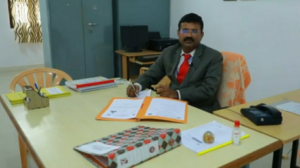
The Civil Engineering department of P.S.R. Engineering College was started in 2009, to cater to the growing needs of builders for our nation and to the world at large. The department also offers a PG program in M.E. Structural Engineering. The Department is recognized as Research Centre by Anna University for Ph.D level research since 2015. The department has the state of art facilities equipped with latest instruments, equipment, and software for imparting technical knowledge on par with international requirements. Under graduate and Post-graduate students and Research Scholars from our department of civil engineering are imparted with theoretical and practical knowledge which enables them to succeed and have an edge in the competitive world. The students here experience an unparalleled education journey, which prepares them to be a global construction business leader. Apart from academic learnings, the students get an opportunity to participate in various activities and events all throughout the academic year, which contributes to their holistic development. All the students undergo a summer internship programme, which gives them a chance to explore and experience the corporate work life.
Besides high quality teaching and research at both UG and PG levels, faculty members are actively involved in executing a number of  R&D and Consultancy projects from government agencies including DST, ISRO, UGC, AICTE and also from many reputed industries. The department of Civil Engineering with its multifaceted faculty members, continues to maintain and cultivate its strong link with the infrastructural industry such as L&T, Southern Railway, Tamilnadu Public Work Department, DLF, RAMCO, Godrej, TATA Consultancy, etc.
I welcome you to be a part of this journey at P.S.R Engineering College, Sivakasi.
All the best to you.
Dr. M.Shahul Hameed,
Professor & Head,
Dean Research
CONTACTS
Dr. M.SHAHUL HAMEED
Professor & Head,
Dept. of Civil Engineering,
PSR Engineering College,
Sevalpatti, Sivakasi – 626 140,
Virudhunagar District,
Tamil Nadu, India.
Email : hod_civil@psr.edu.in
Phone : 04562-239600
Faculty Members
The faculty in the department is a rich blend of personnel with industrial and professional experience. The dedicated staff members have sound knowledge in emerging areas. Most faculty members are accomplished doctorates with considerable research and academic experience. The breadth and depth of research interests of the academic staff ensures a high standard lecture courses and provide excellent opportunities for challenging and stimulating final year projects. Individual lecturers supplement their delivery using blackboards, overhead projectors and video projection.
DEPARTMENT OF CIVIL ENGINEERING
| Faculty | Qualification | Designation | Unique ID | Profile | |
|---|---|---|---|---|---|
| Dr.M.Shahul Hameed | M.E., Ph.D., M.B.A., Ph.D., | Professor and Dean(Research) | hod_civil@psr.edu.in | 1-2962601139 | View |
| Dr.N.Sakthieswaran | M.E., Ph.D | Professor | sakthieswaran@psr.edu.in | 1-9509294998 | View |
| Dr.A.Dhanalakshmi | M.E., Ph.D., | Associate Professor | dhanalakshmi.a@psr.edu.in | 1-2288912873 | View |
| Dr. G. Balaji Ponraj | M.E., Ph.D | Associate Professor | balajiponraj@psr.edu.in | 1-2904818653 | View |
| Dr. L. Arun Raja | M.E., Ph.D | Assistant Professor | arunraja@psr.edu.in | 1-2188149843 | View |
| Mr. S. Kathiresan | M.E., | Assistant Professor | kathiresan@psr.edu.in | 1-43374037671 | View |
| Mr.G.Baskar Singh | M.E., (Ph.D) | Assistant Professor | baskarsingh@psr.edu.in | 1-3550042615 | View |
| Mrs. J. Jeyaseela | M.E., | Assistant Professor | jeyaseela@psr.edu.in | 1-2961416241 | View |
| Ms. S. Sowmya | M.E., | Assistant professor | sowmya@psr.edu.in | 1-1055409397 | View |
| Mrs. PA. Velci Shridevi | M.E., (Ph.D)., | Assistant professor | velcishridevi@psr.edu.in | 1-9312156792 | View |
| Ms. T. Thilagalakshmi | M.E., | Assistant Professor | thilagalakshmi@psr.edu.in | 1-43373707553 | View |
| Mrs.A.Poonkuzhali | M.E., | Assistant Professor | poonkuzhali@psr.edu.in | 1-44715928925 | View |
| Mr.S.Kesavan | M.E., | Assistant Professor | kesavan.s@psr.edu.in | 1-7511453388 | View |
| Mr. S.R. Surya Abisek | M.E., | Assistant Professor | suryaabisek@psr.edu.in | 1-44721634124 | View |
Infrastructure
The Department laboratories are equipped with Modern computers & Equipment.
Laboratory
Laboratory Details:
- CAD Laboratory
- Survey Laboratory
- Concrete & Highway Engineering Laboratory
- Soil Mechanics Laboratory
- Structural Engineering Laboratory
- Hydraulic Engineering Laboratory
- Environmental Engineering Laboratory
CAD Laboratory
70 Number of Systems well Equipped with Internet Facility & Major Civil Software’s such as
- Revit Architecture
- Auto CAD
- STADD Pro
- 3DS Max
- Civil 3D
- Structural Bridge Design
- Sketch Book
Survey Laboratory
The Major Equipments in the Survey Laboratory are
- Total Station
- Auto Level
- Theodolite
- GPS
Concrete & Highway Engineering Laboratory
The Major Equipments in the Concrete and Highway Engineering Laboratory are
- Universal Testing Machine
- Compression Testing Machine
- Los Angels Abrasion Testing Machine
- Ductility Testing Machine
Soil Mechanics Laboratory
The major equipments in the soil mechanics laboratory are
- Direct Shear Apparatus
- Tri Axial Shear Apparatus
- Three Gang Consolidation Test Device
- Unconfined Compression Test
- Universal Permeameter
- Standard Penetration Test
- CBR Apparatus
STRUCTURAL ENGINEERING LABORATORY
The Major Equipments in Structural Engineering Laboratory are
- Loading Frame
- Hydraulic Jack
- Load Cell
- Rebound Hammer
- Ultrasonic Pulse Velocity Tester
- Vibration Meter
HYDRAULIC ENGINEERING LABORATORY
The Major Equipment in the Hydraulics Engineering Laboratory are
- Bernoulli’s Theorem – Verification Apparatus
- Centrifugal Pump Assembly with Accessories (Single Stage)
- Centrifugal Pump Assembly with Accessories (Multi Stage)
- Reciprocating Pump Assembly with Accessories
- Deep Well Pump Assembly set with Accessories
- Impulse Turbine Assembly with Fittings & Accessories
- Francis Turbine Assembly with Fittings & Accessories
- Kaplan Turbine Assembly with Fittings & Accessories
- Gear Pump
Environmental Engineering Laboratory
The Major Equipment in Environmental Engineering Laboratory are
- BOD & COD Analyser
- Flame Photometer
- Fluoride Ion Meter
- Spectrophotometer
- Sterilization Chamber
Department Library
Department Library
The Civil Engineering Department Library has around 170 books & 66 code books, Also it has the provision for keeping the reports of project work done by our students. The departmental library also has reading halls that can accommodate about 20 Students.
List of Journals:
- Journal of Structural Engineering (JOSE)
- The Indian Concrete Journal
- Journal of the Institute of Engineers (India)-Series A
- Indian Journal of Engineering & Materials Sciences
- NICMAR – Journal of construction Management
- MAUSAM
- Journal of Environmental science and Engineering (JESE)
- Journal of Rural Development (JRD)
- Indian Journal of Geosynthetics and Ground Improvement
List of Magazines:
- Civil Engineering Construction Review
- Built Expressions
- Indian Infrastructure
- Renewable Watch
- Estate World
- MAUSAM
- Small Medium Entrepreneur
- Empolyment News
- Empolyment Services
- LIST OF TEXT BOOKS AVAILABLE : 381
- LIST OF CODE BOOKS AVAILABLE : 498
- LIST OF PROJECT BOOKS AVAILABLE : 609
Course Materials
- 161CE74 - DESIGN OF STEEL STRUCTURES
- 161CEE17 - Town Planning and Architecture
- 161OE706- ENVIRONMENTAL AND ECOLOGY
- 161CEE19 - Ground improvement techniques
- 161CEE04 - PRESTRESSED CONCRETE STRUCTURES
- 191CE51 - MECHANICS OF SOLIDS
- 191CE52 - Structural Analysis - I
- 191CE53 - ENVIRONMENTAL ENGINEERING
- 191CE54 - reinforced concrete structure - 1
- 191ME31 - ENGINEERING MECHANICS
- 191CE32- Engineering Geology
- 191CE55 Hifghway Railway Engineering
- 191CE32 – Surveying
- 191CE33 - FLUID MECHANICS
- 191MA31 – TFPD
Placement
PSR has a long story of recruiting their graduates and postgraduates to a variety of companies both nationwide and MNCs. Over the past few decades, students get acquired over 1000+ companies all around the globe. They are at the forefront in all hiring programs hosted in the college as well as in the drafting campaigns.
STUDENT PLACED IN THE YEAR 2020-202
S.NO |
NAME OF THE STUDENT |
NAME OF THE COMPANY |
| 1. | T.DHIVAKAR | G-SPATIAL TECHNOLOGIES |
| 2. | S.JAGATHEESWARAN | G-SPATIAL TECHNOLOGIES |
| 3. | S.NAVEEN SUDHIR KUMAR | G-SPATIAL TECHNOLOGIES |
| 4. | K.AJITH | G-SPATIAL TECHNOLOGIES |
| 5. | A.ASHOK KUMAR | G-SPATIAL TECHNOLOGIES |
| 6. | V.THIRUPATHI RAJ | G-SPATIAL TECHNOLOGIES |
| 7. | KINGSLIN CHRISTOPER J | G-SPATIAL TECHNOLOGIES |
| 8. | KOKILADEVI P S | G-SPATIAL TECHNOLOGIES |
| 9. | RAHMATH FATHIMA M | G-SPATIAL TECHNOLOGIES |
| 10. | RAJAN A | G-SPATIAL TECHNOLOGIES |
| 11. | G.MUPPUDATHI | G-SPATIAL TECHNOLOGIES |
| 12. | G.SRITHARAN | ASHWIN CONSTRUCTION |
| 13. | G.PANDIYARAJAN | PINNACLE INFOTECH |
| 14. | H.SANTHOSH KUMAR | NIKA CG CONSTRUCTION |
| 15. | K.SUBASH | L&T METRO |
| 16. | P. ARICHANDRAN | SIGLOBA CONSTRUCTION |
| 17. | K.GOWTHAM | G.K CONSTRUCTION |
| 19. | N.PRATHIP RAJ | SUN GLASS AND FABRICATION |
| 20. | A.PALANI RAM | TRAINEE ENGINEER, GOVT PROJECTS |
| 21. | K.BHARATH KUMAR | AADHI INDUSTRIES |
| 22. | G.RAGAVENDRA | V.R. ENGINEERING |
| 23. | G.SATHIYA NARAYANAN | JUNIOR TRAINEE ENGINEER , GOVT PROJECTS |
STUDENT PLACED IN THE YEAR 2020-2021
| SL NO | NAME OF THE STUDENT | COMPANY NAME |
| Â 1 | P.ACHARI RAJESHWAR | OMEGA CONSTRUCTION PVT. LTD., |
| Â Â 2 | M.ARAVIND | JC ASSOCIATES |
| Â 3 | M.ARUNKUMAR | STARWORTH INFRASTRUCTURE |
| Â 4 | M.BHARATHKUMAR | OMEGA CONSTRUCTION PVT. LTD., |
| Â 5 | M.DHINESH | JC ASSOCIATES |
| Â 6 | S. DIVYALAKSHMI | A & B HR ASSOCIATES |
| Â 7 | K ELANGOVAN | JC ASSOCIATES |
| Â 8 | K.GOKULARAJAN | ELITE ESTATE |
| Â 9 | R.GURU PACKIYAM | MMC INFOTECH |
| Â 10 | P JAISINGH | ELITE ESTATE |
| Â Â 11 | S.KAMALASUNDARAM | JAYAM ENGINEERING CONSTRUCTION |
| Â Â 12 | J.KANAGA DURGA | A & B HR ASSOCIATES |
| Â Â 13 | S.KARTHICK KUMAR | JAYAM ENGINEERING CONSTRUCTION |
| Â Â 14 | M.KAPILRAJ | JAYAM ENGINEERING CONSTRUCTION |
| Â Â 15 | M.KARTHIKEYAN | JAYAM ENGINEERING CONSTRUCTION |
| Â Â 16 | C.KESAVAN | MMC INFOTECH |
| Â Â 17 | N.KOWSIKA | A & B HR ASSOCIATES |
| Â Â 18 | A. LAKSHMI PRABHA | MMC INFOTECH |
| Â Â 19 | C.MANOJ KUMAR | ELITE ESTATE |
| Â 20 | S.MANTHRA MOORTHY | ELITE ESTATE |
| Â 21 | A.MOHAN KUMAR | JAYAM ENGINEERING CONSTRUCTION |
| Â 22 | V. MURUGAVENI | ELITE ESTATE |
| Â 23 | G.MUTHUKUMAR | ELITE ESTATE |
| Â 24 | R.MUTHUPANDIAN | JAYAM ENGINEERING CONSTRUCTION |
| Â 25 | E.NAGARATHINAM | ELITE ESTATE |
| Â 26 | A.NAVEENKUMAR | STARWORTH INFRASTRUCTURE |
| Â 27 | S.NIRANJANA | A & B HR ASSOCIATES |
| Â 28 | J.PALANINATHAN | JAYAM ENGINEERING CONSTRUCTION |
| Â 29 | S.PARAMA SUNDAR | JAYAM ENGINEERING CONSTRUCTION |
| Â 30 | S.PRADEEP KUMAR | ELITE ESTATE |
| Â Â 31 | R.PRAVIN | ELITE ESTATE |
| Â Â 32 | J N. PUVANESHWARAN JN | JAYAM ENGINEERING CONSTRUCTION |
| Â Â 33 | R.RAMKUMAR | ELITE ESTATE |
| Â Â 34 | A.RAMACHANDRAN | JAYAM ENGINEERING CONSTRUCTION |
| Â Â 35 | A.RAMESH KANNA | JAYAM ENGINEERING CONSTRUCTION |
| Â Â 36 | A.SARDARMALIK | OMEGA CONSTRUCTION PVT. LTD., |
| Â Â 37 | R.SATHISHKUMAR | ELITE ESTATE |
| Â Â 38 | P.SHALINI | RIDH ENGINEERING SOLUTION |
| Â Â 39 | S.SIVACHANDRAN | OMEGA CONSTRUCTION PVT. LTD., |
| Â Â 40 | M.SIVAKUMAR | ELITE ESTATE |
| Â 41 | M. SUDALAI THIRAVIYAM M | SAANVI STRUCTURAL SOLUTION |
| Â 42 | S.SUREKA | ELITE ESTATE |
| Â 43 | M.K.SUVEKA | ELITE ESTATE |
| Â 44 | R.THENMOZHI | ELITE ESTATE |
| Â 45 | M.VARALAKSHMI | MMC INFOTECH |
| 46 | R.VASANTH | ELITE ESTATE |
| 47 | T.VASANTHA RUBAN | JC ASSOCIATES |
| 48 | K.VELMURUGAN | RIDH ENGINEERING SOLUTION |
| 49 | A.VIGNESH | JC ASSOCIATES |
| 50 | P.VIGNESH | OMEGA CONSTRUCTION PVT. LTD., |
| Â 51 | B.VISHAL | ELITE ESTATE |
| Â 52 | K.YADHAVAN | JAYAM ENGINEERING CONSTRUCTION |
| Â 53 | B.YOGASH | RIDH ENGINEERING SOLUTION |
| Â 54 | G.ARUNKUMAR | ELITE ESTATE |
| Â 55 | R. GOKUL KANNA | ELITE ESTATE |
| Â 56 | K.JEGAN | ELITE ESTATE |
| Â 57 | A. JOSEPH REFFIN | OMEGA CONSTRUCTION PVT. LTD., |
| Â 58 | G.NAVEEN BABU | ELITE ESTATE |
| Â 59 | E.RAJKUMAR | ELITE ESTATE |
| Â 60 | S.SURYA | SAANVI STRUCTURAL SOLUTION |
STUDENT PLACED IN THE YEAR 2019-2020
| Serial No | Name of the student | Name of the Company |
| 1 | V.ABARNA | Sureti Insurance Marketing Pvt.ltd |
| 2 | ARUNKUMAR P | MMC INFOTECH SERVICES PVT LTD |
| 3 | CHANDHRU V | Sureti Insurance Marketing |
| 4 | CHANDRU.S | Sureti Insurance |
| 5 | DURKA G | MMC Infotech Private Limited |
| 6 | K.GOKILA | SURETI INSURANCE AND MARKETING COMPANY |
| 7 | ISWARYA. S | MMC Infotech private. Lmtd |
| 8 | JEYABHARATHI.V | MMC INFOTECH |
| 9 | KARTHEESWARAN R | Sureti Insurance And Marketing |
| 10 | D.KARUPPASAMY | Sureti Insurance And Marketing |
| 11 | MAHESHPRIYA K | MMC Infotech Private Limited |
| 12 | S.MATHAN KUMAR | Surety Insurance Company |
| 13 | A. MUNEESWARAN | S.R Construction, Madurai |
| 14 | N NIVETHITHA | Sureti Insurance Marketing Company |
| 15 | PRAVEENKUMAR. P | Elite Estate |
| 16 | RAJA GURU RAVI | Elite State Company |
| 17 | G.RAMBALAJI | Elite State Company |
| 18 | RAMYA S | Sureti Insurance Pvt Limited |
| 19 | RAVISANKAR R | Elite Estate |
| 20 | RISHIKESAVALAKSHMI. A | Sureti Insurance Pvt Limited |
| 21 | RUBA R | Sureti Insurance Marketing Finance Company |
| 22 | SAKTHIGANESH.S | Elite |
| 23 | I.SANTHIYA | SURETI IMF company |
| 24 | SANTHOSH. K | Elite Estate |
| 25 | SASIKUMAR.R | Surety Insurance Company |
| 26 | C.SINDHU | Sureti Insurance Pvt Limited |
| 27 | N.SRIDEVI | MMC Infotech services Pvt limited |
| 28 | M SRIDHAR | Mass Mailing Center (MMC) |
| 29 | V. SUBASHINI | MMC Infotech |
| 30 | S.UTHAYANANTHA | Surety |
| 31 | A.VIGNESH | Elite Estate |
| 32 | R.VIGNESH | SURETI INSURANCE MARKETING |
| 33 | P. VIGNESHWARAN | Elite Sales Force |
| 34 | VIJAYARAGAVAN.K | Elite Estate |
| 35 | KALIESWARAKARUPPASAMY S | Sureti Insurance Company |
| 36 | V. CINTHIYAVINISHA | Elite Estimate |
| 37 | R.DHANAPAL | Elite Estimate |
| 38 | P.KALEESWARI | Surety Insurence Marketing Company |
| 39 | MADHAVAN | SURETI INSURANCE MARKETING PVT LTD |
| 40 | MATHAN.R | Starworth Infrastructure Pvt. Ltd |
| 41 | SANKARASUBBU J | Surety Insurance And Marketing Company, Coimbatore |
| 42 | VIJAYARAGAVAN N | Surety Insurance And Marketing Company, Coimbatore |
| 43 | N.SUSINDRAN | CBRE South Asia Pvt ltd |
| 44 | R.VEERALAKSHMI | MMC Infotech Private Limited |
| 45 | M.VISHNURAM | MMC Infotech Private Limited |
STUDENT PLACED IN THE YEAR 2018-2019
| Serial No | Name of the student | Name of the Company |
| 1 | AJAY KUMAR B | IDBI federal insurance |
| 2 | AJITH KUMAR K | IDBI federal insurance |
| 3 | ANAND KUMAR K | IDBI federal insurance & M/s. Eureka Forbes |
| 4 | ARAVINTHAN A | Presto Land Survey Institute |
| 5 | BANUPRIYA P | Presto Land Survey Institute |
| 6 | BUVANESHWARAN G | Presto Land Survey Institute |
| 7 | GAJENDRAKUMAR S | Presto Land Survey Institute |
| 8 | GIRI RAJA KUMARAN M | M/S. Ethnus Banglore. M/s. justdial, Eureka Forbes, Presto Land Survey Institute. |
| 9 | GOKUL T | IDBI federal insurance |
| 10 | JEYAJOTHIRAMACHANDRIGA P | M/S. Ethnus Banglore. M/S ILM, Bangalore |
| 11 | KANNAN N | Presto Land Survey Institute |
| 12 | RAJA NIVETHA S | M/S ILM, Bangalore |
| 13 | RAJESH KANNAN | IDBI federal insurance |
| 14 | RAMA SUBRAMANIYAN A | IDBI federal insurance |
| 15 | SHANMUGA RAJ S S | IDBI federal insurance, Presto Land Survey Institute |
| 16 | SHYLUCK M | IDBI federal insurance |
| 17 | SIVA SANKAR B | M/S. Ethnus |
| 18 | SOUNDARYA P | Eureka Forbes |
| 19 | SURYA ABISEK S R | IDBI federal insurance |
| 20 | SURYASIVA V | IDBI federal insurance |
| 21 | UTHAYA KUMAR M | IDBI federal insurance, Presto Land Survey Institute. |
| 22 | VEERA ASHOK B | IDBI federal insurance & Eureka Forbes |
| 23 | VIGNESH S | IDBI federal insurance |
| 24 | VIGNESHKUMAR S | Presto Land Survey Institute |
| 25 | VIJAYA MURALI SANKAR S | M/S. Ethnus & IDBI insurance ltd., |
| 26 | VINOTH S | Presto Land Survey Institute |
| 27 | ARIRAMAKANNAN N | Eureka Forbes |
| 28 | GOPINATH R | M/S ILM, Bangalore, IDBI insurance, Presto Land Survey Institute. |
| 29 | KARTHICK M | Presto Land Survey Institute |
| 30 | MANIKANDAPRABHU T | Eureka Forbes |
| 31 | VENKATESHAN J | M/s.Eureka Forbes & IDBI federal insurance |
| 32 | VINAYAGAMOORTHY K | M/s.Eureka Forbes |
STUDENT PLACED IN THE YEAR 2017-2018
| Serial No | Name of the student | Name of the Company |
| 1 | R.AKILA | LEXIS SOLUTION, Coimbatore |
| 2 | B. ANAND | EUREKA FORBES, Chennai |
| 3 | S.ANTO SHANTHOSH ROCHE | ILM, Banglore SURTHERNLAND, Chennai, ALLSEC, Chennai |
| 4 | M. BAVITHRAN | EUREKA FORBES, JUSTDIAL, Chennai |
| 5 | A.CHIDAMBARAKANNAN | EUREKA FORBES, Chennai JUSTDIAL, Chennai |
| 6 | S. CHINNADURAI | EUREKA FORBES, Chennai |
| 7 | C.R DHEVANATH | EUREKA FORBES, Chennai |
| 8 | N. DHINESH PRABU | EUREKA FORBES, Chennai ALLSEC, Chennai |
| 9 | E. DINESHKUMAR | EUREKA FORBES, Chennai |
| 10 | M.DINESH KUMAR | LEXIS SOLUTION, Coimbatore |
| 11 | P.ESAKKIRAJ | LEXIS SOLUTION, Coimbatore |
| 12 | L. GOKULNATH | EUREKA FORBES, Chennai |
| 13 | S.GOWSALYAVINOTHINI | LEXIS SOLUTION, Coimbatore ALLSEC, Chennai |
| 14 | D.HARITHA | LEXIS SOLUTION, Coimbatore |
| 15 | B. JAWAHAR | EUREKA FORBES, Chennai |
| 16 | K.JOTHI VIGNESH | EUREKA FORBES, Chennai |
| 17 | V. JOTHIMANI | EUREKA FORBES, Chennai |
| 18 | V. KALIRAJ | EUREKA FORBES, Chennai |
| 19 | G. KANNAN | EUREKA FORBES, Chennai |
| 20 | A.KEERTHANA | LEXIS SOLUTION, Coimbatore SURTHERNLAND, Chennai ALLSEC, Chennai |
| 21 | M. MANIKANDAN | DHISHA INTERIORS, Chennai |
| 22 | S.MANIKANDAN | EUREKA FORBES, Chennai |
| 23 | N. MANOJKUMAR | EUREKA FORBES, Chennai |
| 24 | A. MEGAVARMAN | EUREKA FORBES, Chennai |
| 25 | M.MURSHITHA PARVEEN | ILM, Bangalore SURTHERNLAND, Chennai |
| 26 | G.MURUGALAKSHMI | LEXIS SOLUTION, Coimbatore |
| 27 | M. MUTHUKUMAR | EUREKA FORBES, Chennai |
| 28 | S. MUTHUKUMAR | EUREKA FORBES, Chennai |
| 29 | K.NAGOOR NISHANA | LEXIS SOLUTION, Coimbatore ALLSEC, Chennai |
| 30 | S. NAVEEN KUMAR | EUREKA FORBES, Chennai |
| 31 | P.NIRMALADEVI | LEXIS SOLUTION, Coimbatore |
| 32 | S.NITHYA SUBHASREE | ILM, Bangalore SURTHERNLAND, Chennai |
| 33 | K.S. PAVITHRA | ALLSEC, Chennai EUREKA FORBES, Chennai |
| 34 | A.PONRAJ | LEXIS SOLUTION, Coimbatore |
| 35 | A.RAGASREE | LEXIS SOLUTION ALLSEC, Chennai |
| 36 | M.RAGAVI | C.CORE, Lucknow |
| 37 | N. RAJU@KUTTIRAJ | EUREKA FORBES, Chennai |
| 38 | N. RAMVIGNESH | EUREKA FORBES, Chennai |
| 39 | N. RASATHI | EUREKA FORBES, Chennai |
| 40 | H.RIYAS BARVEEN | LEXIS SOLUTION, Coimbatore ALLSEC, Chennai |
| 41 | A.RIZWANA FATHIMA | LEXIS SOLUTION, Coimbatore |
| 42 | S.ROHINI | LEXIS SOLUTION, Coimbatore |
| 43 | S.SAM GAUTHAM RAJADURAR | ILM, Bangalore |
| 44 | SARAVANAPERUMAL.M | EUREKA FORBES, Chennai |
| 45 | SASIMEKALA.M | .JUSTDIAL, Chennai |
| 46 | G.SELVA SAKTHI | LEXIS SOLUTION, ALLSEC , Chennai |
| 47 | R.SHRI ARTHI | ILM, Bangalore |
| 48 | C.R SIDDHARTH | EUREKA FORBES, Chennai |
| 49 | K.SIVA KARTHICKSAMY | EUREKA FORBES, Chennai |
| 50 | V. SIVABALASHANKAR | EUREKA FORBES, Chennai |
| 51 | V. SUDALAI | EUREKA FORBES, Chennai DHISHA INTERIORS, Chennai ELITE CONSTRUCTION PVT.LTD. HYDERABED |
| 52 | V. SURAJ HARISH | EUREKA FORBES, Chennai C.CORE, Lucknow ILM, Bangalore |
| 53 | M.THANGAMARIAPPAN | EUREKA FORBES, Chennai |
| 54 | M.VELMURUGAN | LEXIS SOLUTION, Coimbatore |
| 55 | K.VIJAYA RAGHAVAN | ILM, Chennai ALLSEC, Chennai |
| 56 | J. VISHNU | EUREKA FORBES, Chennai ALLSEC, Chennai |
| 57 | P. ARUNPANDIAN | EUREKA FORBES, Chennai |
| 58 | PRAKASH.R | EUREKA FORBES, Chennai |
| 59 | M.RAJAGURU | E-CARE, Tirunelveli |
| 60 | RAJAKRISHNA.R | EUREKA FORBES, Chennai |
| 61 | P.SELVARAJ | LEXIS SOLUTION, Coimbatore Elite Construction Pvt. Ltd., Hyderabed |
| 62 | SINDHUJAA JEYARAM | LEXIS SOLUTION, Coimbatore |
| 63 | R. VINOTHKUMAR | EUREKA FORBES, Chennai |
STUDENT PLACED IN THE YEAR 2016-2017
| Serial No | Name of the student | Name of the Company |
| 1 | ABUSALI.M | IDBI Federal Insurance Co. Ltd., Coimbatore |
| 2 | ALWAR DEVI.S | IDBI Federal Insurance Co. Ltd., Coimbatore, Maysoft tech Pvt. Ltd., Chennai, FIRST SOURCE, chennai |
| 3 | ANAND.T | JSk Infolink solutions, Madurai, Institute of language management Pvt.ltd., Banglore |
| 4 | APARNA.R | IDBI Federal Insurance Co. Ltd., Coimbatore |
| 5 | APARNA DEVI.R | IDBI Federal Insurance Co. Ltd., Coimbatore |
| 6 | BALAJI.M | JSk Infolink solutions, Madurai, FIRST SOURCE, chennai |
| 7 | BALAMOORTHI.K | Allsec Technologies, chennai |
| 8 | CHIDAMBARAKUMAR.M.G | FIRST SOURCE, Chennai, AEGIS, chennai |
| 9 | DARWIN.R | Allsec Technologies, chennai |
| 10 | DHARANI.R | IDBI Federal Insurance Co. Ltd., Coimbatore, Institute of language management Pvt.ltd., Banglore, FIRST SOURCE, chennai |
| 11 | HARIHARAN.M | FIRST SOURCE, chennai |
| 12 | HEMANADINI.A.T | IDBI Federal Insurance Co. Ltd., Coimbatore, Lexis Solutions, Coimbatore, FIRST SOURCE, chennai |
| 13 | LYDIA.J | IDBI Federal Insurance Co. Ltd., Coimbatore, Lexis Solutions, Coimbatore, Institute of language management Pvt.ltd., Banglore, FIRST SOURCE, chennai |
| 14 | MANIKANDAN.S | FIRST SOURCE, chennai |
| 15 | MARIA THANGARAJ.J | FIRST SOURCE, Chennai, Allsec Technologies, chennai |
| 16 | MASILAMANI.A | Allsec Technologies, chennai |
| 17 | MURUGESWARI.K | HEXAWARE TECHNOLOGIES |
| 18 | NAGARAJ. J | JSk Infolink solutions, Madurai |
| 19 | NARMADHA.M | HEXAWARE TECHNOLOGIES, Allsec Technologies, chennai |
| 20 | PANDISUBHA.P | FIRST SOURCE, Chennai, HGS,CHENNAI |
| 21 | PAVITHRA LAKSHMI.P | HEXAWARE TECHNOLOGIES |
| 22 | RAGAVI.M | Allsec Technologies, chennai |
| 23 | SARANYA.S | E-care, Tirunelveli, Allsec Technologies, chennai |
| 24 | SHANMUGAPRIYA.P | HEXAWARE TECHNOLOGIES |
| 25 | SHANMUGAPRIYA.S | FIRST SOURCE, Chennai. |
| 26 | SUBRAMANI. A | Vee Technologies, chennai |
| 27 | SURJITH. P | Sutherland Global Services |
| 28 | VINAYAK. S | Tech mahindra, chennai |
| 29 | VINOTHKUMAR. R | Allsec Technologies, chennai |
| 30 | SHIVA. P | FIRST SOURCE, Chennai, AEGIS, chennai |
| 31 | TAMIL SELVAN. B | AEGIS, chennai |
STUDENT PLACED IN THE YEAR 2015-2016
| Serial No | Name of the student | Name of the Company |
| 1 | ARUNACHALAM S | VEE TECHNOLOGIES, ZEALOUS SERVICES & MAY SOFTECH. PVT. Ltd |
| 2 | AMUTHA S | POLARIS |
| 3 | ANANDAMARI P | ZEALOUS SERVICES |
| 4 | ARUL SELVAM K | ZEALOUS SERVICES & MAY SOFTECH. PVT. Ltd |
| 5 | ARCHANA S | ZEALOUS SERVICES |
| 6 | ANBU GANDHI P | ILM, Bangalore |
| 7 | DEEPIKA N | ZEALOUS SERVICES |
| 8 | GURUBARAN @ SABARISH P | Polaris BPO, Hydrabad |
| 9 | GANIMOLI M | ZEALOUS SERVICES |
| 10 | INBARAJ J | ZEALOUS SERVICES |
| 11 | KEERTHANA P | ZEALOUS SERVICES |
| 12 | KALIRAJ S | ZEALOUS SERVICES |
| 13 | MUTHU KUMARAN G | VDARTSOFTWARE SERVICES PVT. Ltd, ZEALOUS SERVICES & MAY SOFTECH. PVT. Ltd |
| 14 | MAHADEVAN K | Polaris BPO, Hydrabad |
| 15 | MAHALAKSHMI S | ZEALOUS SERVICES |
| 16 | MUNI KARTHIK RAJA V | ZEALOUS SERVICES |
| 17 | PRIYANKA K | ZEALOUS SERVICES |
| 18 | PRAKASH K | ZEALOUS SERVICES |
| 19 | RINISHA KARTHEESWARI M | VdartSoftware Services Pvt. Ltd |
| 20 | SHAKTHI ANANTHI C | Tech Mahindra Ltd &Sutherland Global Services |
| 21 | SWETHA LAKSHMI V | VdartSoftware Services Pvt. Ltd |
| 22 | SWATHI T | Polaris BPO, Hydrabad |
| 23 | SABARITHA P | ZEALOUS SERVICES |
| 24 | SELVAKUMAR G | ZEALOUS SERVICES |
| 25 | VENKADESH K | ZEALOUS SERVICES |
| 26 | VAISNAVI S | ZEALOUS SERVICES |
STUDENT PLACED IN THE YEAR 2014-2015
| Serial No | Name of the student | Name of the Company |
| 1 | Shanmugam.G | Aagna Corporate Service |
| 2 | Uthrakumar.M | Aagna Corporate Service |
| 3 | Vijayamathavaraj.D | Aagna Corporate Service |
| 4 | Keerthi.D | Aagna Corporate Service |
| 5 | Durga.J | Godrej Group- Eureka OSL |
| 6 | Jemin.S | Godrej Group- Eureka OSL |
| 7 | Venkateswari.R | Godrej Group- Eureka OSL |
| 8 | Sridhar.S | Godrej Group- Eureka OSL |
| 9 | Vijayakumar | M/S. Ihita Engineering Pvt.Ltd. |
| 10 | Vigneshraj.V | Institute of Language Management, Bangalore. |
| 11 | Ramya.R | Institute of Language Management, Bangalore. |
| 12 | Balasundari.S | Institute of Language Management, Bangalore. |
| 13 | Suganya.V | Institute of Language Management, Bangalore. |
| 14 | Arunbalaji.M | Koacher Infotech |
| 15 | Deena Dhayalan.R | Koacher Infotech |
| 16 | Marikani.P | Koacher Infotech |
| 17 | Umamaheswari.A | Koacher Infotech |
| 18 | Pandiaraj.M | Koacher Infotech |
| 19 | Jayajothi.G | Koacher Infotech |
| 20 | Anandavalli.S | Koacher Infotech |
| 21 | Dharmaraj.S | Reliance Communications |
| 22 | Balamurugan.B | Reliance Communications |
| 23 | Jayasornavel.M | Reliance Communications |
| 24 | Linga Raja Durai.E | Reliance Communications |
| 25 | Marimuthu.S | Reliance Communications |
| 26 | Paulraj.W | Reliance Communications |
| 27 | Sirijudeen.A | Reliance Communications |
| 28 | Shankar Ganesh.R | Reliance Communications |
| 29 | Sankarkumar.S | Zealous Services Pvt Ltd |
| 30 | Vinothkumar.M | Zealous Services Pvt Ltd |
| 31 | Kameswarakumar.V.S | Zealous Services Pvt Ltd |
| 32 | Manimaran.T | Zealous Services Pvt Ltd |
| 33 | Mohan.R | Zealous Services Pvt Ltd |
| 34 | Muthukumar.K | Zealous Services Pvt Ltd |
| 35 | Kathishkumaran.R | Zealous Services Pvt Ltd |
| 36 | Ramakrishnan.S | Zealous Services Pvt Ltd |
| 37 | Sankarganesh.R | Zealous Services Pvt Ltd |
| 38 | Manoj.D | Zealous Services Pvt Ltd |
| 39 | Raja.M | Zealous Services Pvt Ltd |
| 40 | Vaishnavi.C | Zealous Services Pvt Ltd |
| 41 | Vidhya.K | Zealous Services Pvt Ltd |
| 42 | Gnanaprakasham.N | Zealous Services Pvt Ltd |
| 43 | Nagarajan.S | Zealous Services Pvt Ltd |
Events
The college organizes events with many purposes in intention. Some of the significant events were on support on employment workshops, entertainment, academic studios, international and socio-cultural activities, etc. The objective is to create a multicultural and international understanding among the students and staff.
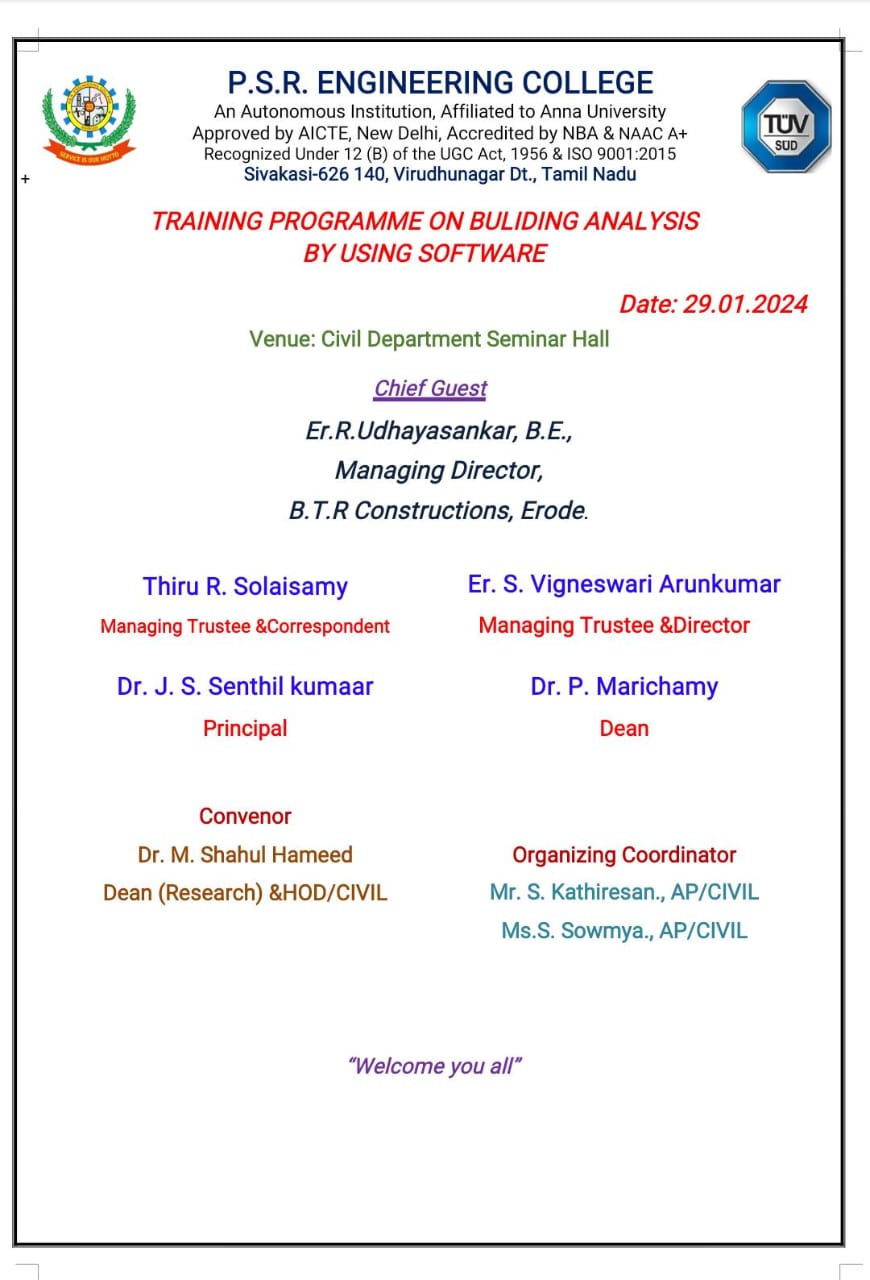
Department of Civil Engineering conducted *Six days Training program on " Training Programme on Building Analysis by using software" *. Session handled by Er. Udhayasankar , Managing Director, B.T R. Construction, Erode. On 29.01.2024 to 03.02.2024
Er.R.Udhayasankar ,B.T.R Constructions, Bhavani sagar, Delivered the Value Added Course for STAAD Pro software dated on 19.12.22
Shanmugasundaram raju, Deputy General Manager, JSW Cement & Steel, Sales & Techno-Marketing- TN & KL delivering Special address to the participants “Career Guidance for Civil Engineering†Programme dated on 08.11.2022
Er.R.Udhayasankar ,B.T.R Constructions, Bhavani sagar, Delivered the Value Added Course for STAAD Pro software dated on 19.09.22
AR Webster Phil Russelo, Architect, Dream Zone, Madurai,Delivered the Engineers Day-2022 Address dated on 15.09.22
Mr.A.Seetharaman, Examiner from patents and designsdiscussed the about the property rightsthrough webex Meet dated on 02.03.2022.
Dr.M.Shahul Hameed Dean Research & HOD/CIVIL, deliver the field training to the civil students, P.S.R.Engineering College Ground dated on 05.01.2022
Er. A. Arivazhagan, Arrivu Associates, Madurai delivering Special address to the participants, on “Career Opportunities for Civil Engineering†awareness Programme dated on 04.01.2022
Mr. M. MEENAKSHI SUNDARA VENKATESAN, Professor, Department of Mathematics, Delivered the address on “National Mathematics Day -2021†dated on 28.12.2021
Dr.M. Shahul Hameed (Dean Research & HOD/Civil), deliver Special address to the participants, on the occasion of “Career Opportunities for Civil Engineers Programme†dated on 22.12.2021
Er.P.Vellington Babu, Owner of Reshiba Construction address the participants, on the topic of “Construction Practices for field work†dated on 20.10.2021.
Er. K. Mahadevan, Project Manager, LETS America Inc. Hermosillo, Sonora Mexico, USA. Deliver the address “World Heart Day†on 18th October 2021
Mr. Takeaki Nadabe, Drone Copany, Japan addressed the participants on the topic of “International Disaster Reduction Day” dated on 13.10.2021.
Dr. P. K. Gomathi,Assistant professor of English address the participants, on the topic of “ International Girl Child day” dated on 11.10.2021
Er.T. Rajesh, Site Engineer, Air force Station, Thanjavur - 613 005., Delivered Indian Air Force Day-2021 Chief Guest Address
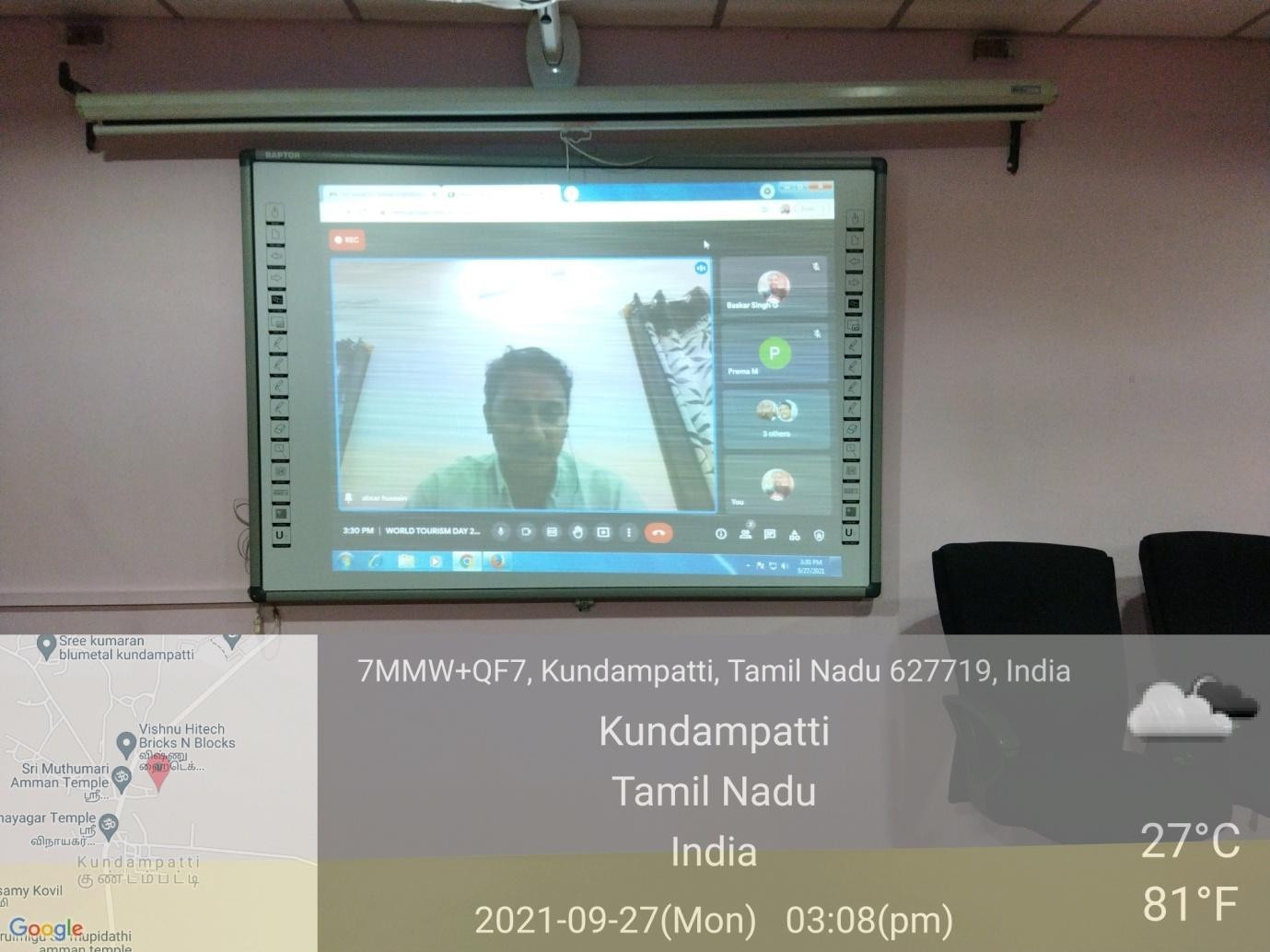
Mr. Absar Hussian., MBA., Team Leader, Fursan Travels and Tourism, Kingdom of Saudi Arabia address the participants, on the topic of “World Tourism Day” dated on 27.09.2021.
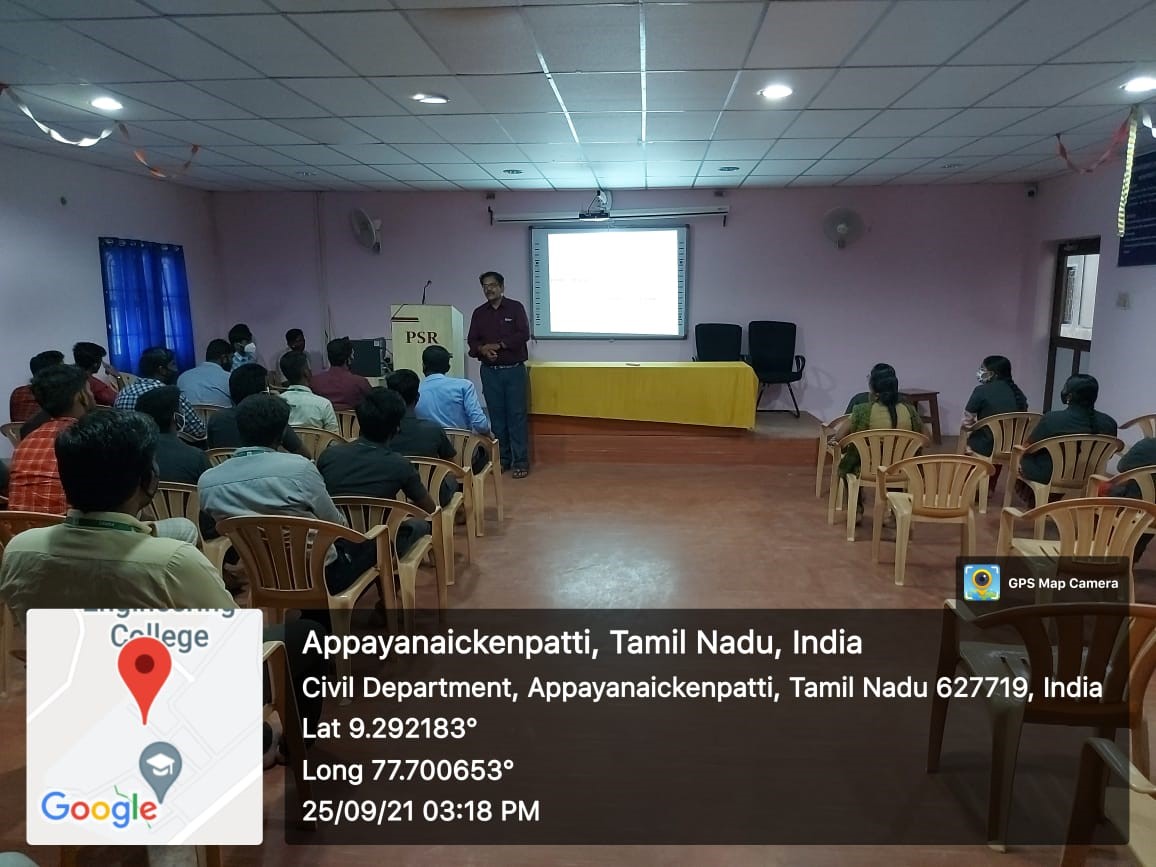
Dr.K.M.Basanth Babu, Professor of civil engineeringaddress the participants, on the topic of “How to do a design project?” dated on 25.09.2021
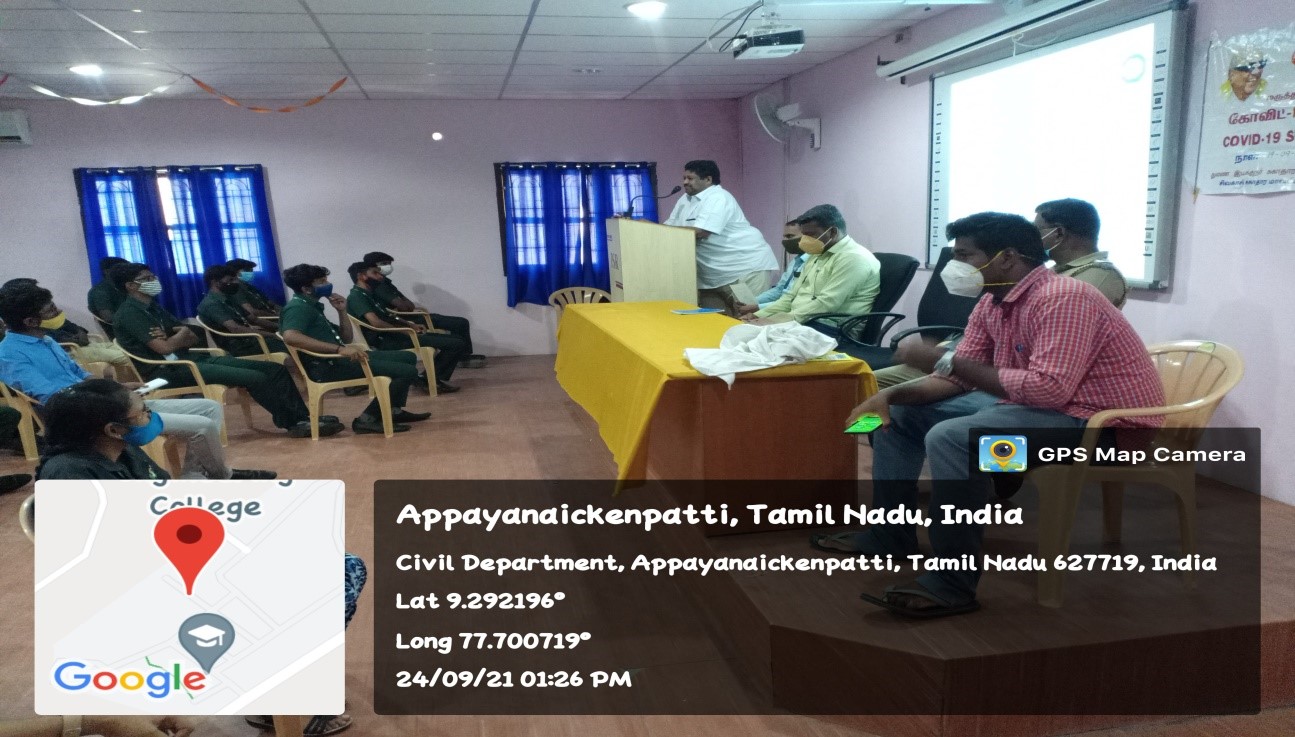
Thiru.Rengasamy, Special Tahsildar Vembakottai Taluk, to delivers the Special address to the participants, on the occasion of “Corona Awareness Programme” dated on 24.09.2021.
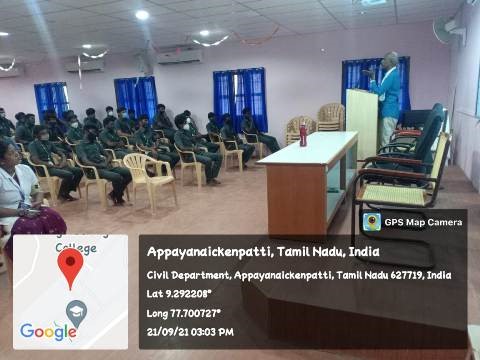
Mr.Mahavanadoss, Managing Trustee of Sri Mahavana Rural Trust address the participants, on the topic of “World Peace Day” dated on 21.09.2021.
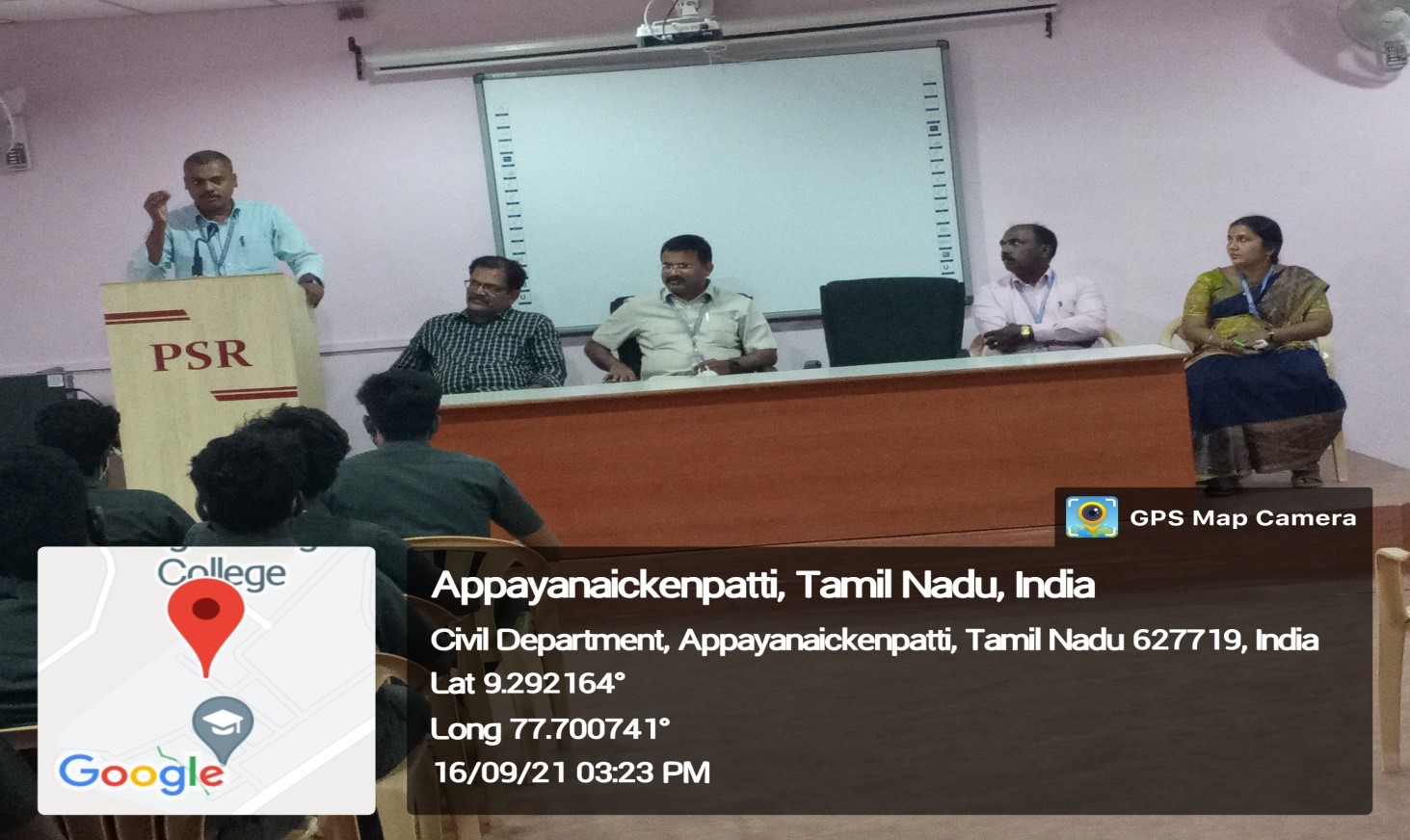
Dr.S.Manikandan Professor & Head of Bio Medical Engineering, P.S.R.Engineering College address the participants, on the topic of “World Ozone Day” dated on 16.09.2021.
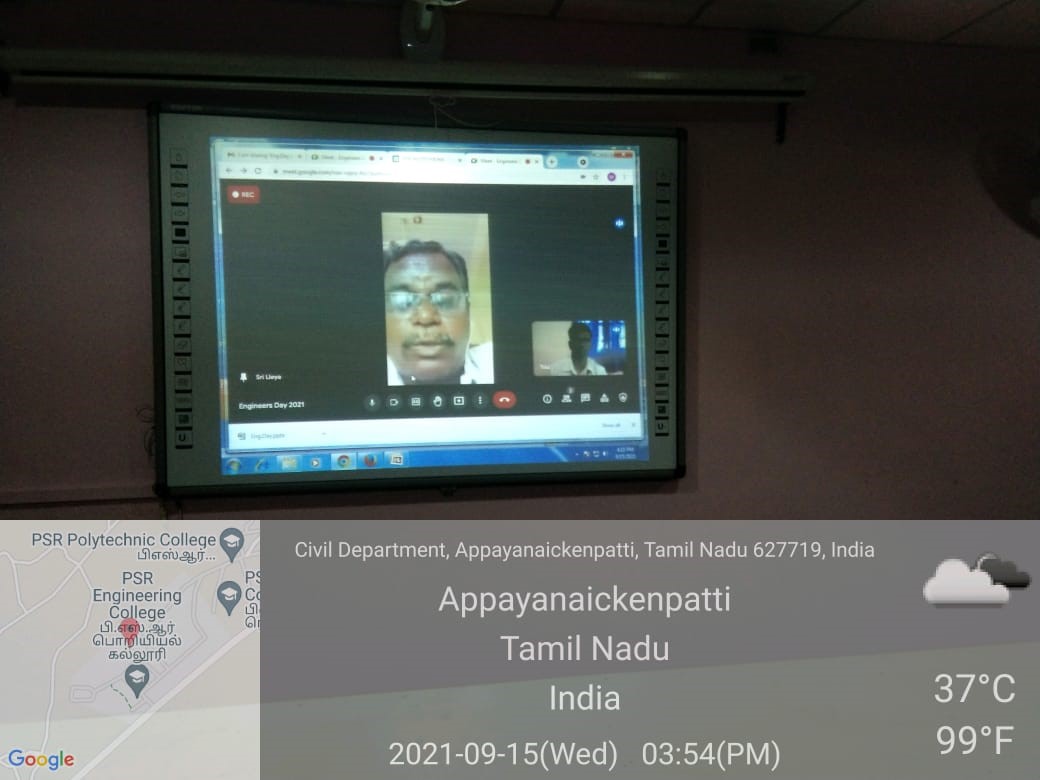
Dr. M.Dhanasekara Pandian, Assistant Engineer, Water Resource Department, Environmental Cell Sub division, Tirunelveli, Delivered Engineers Day-2021 Chief Guest Address on 15.09.2021.
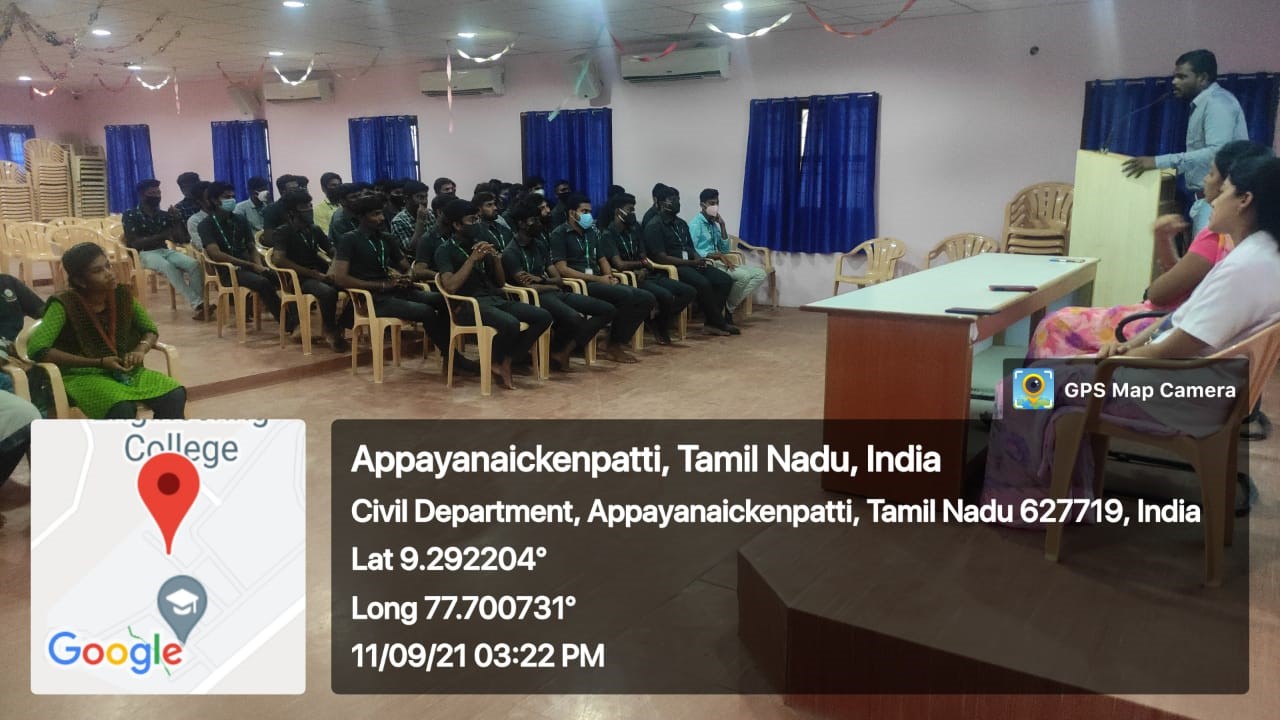
The resource person, Mr. A. Prakash Physical Director of P.S.R. Engineering College, Sivakasi, addressed the participants on titled “WORLD FIRST AID DAY” on 11.09.2021.
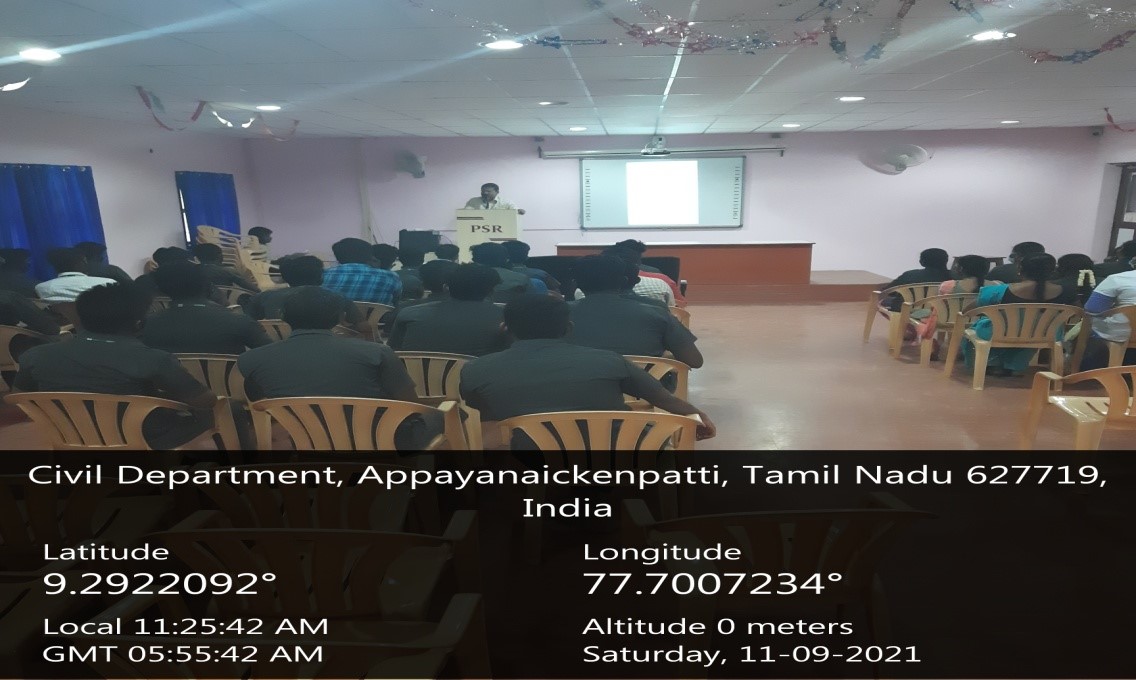
Dr.M. Shahul Hameed Professor & Head/Civil Engineering addressed to the participants on the event of “NATIONAL FOREST DAY” on 11.09.2021.
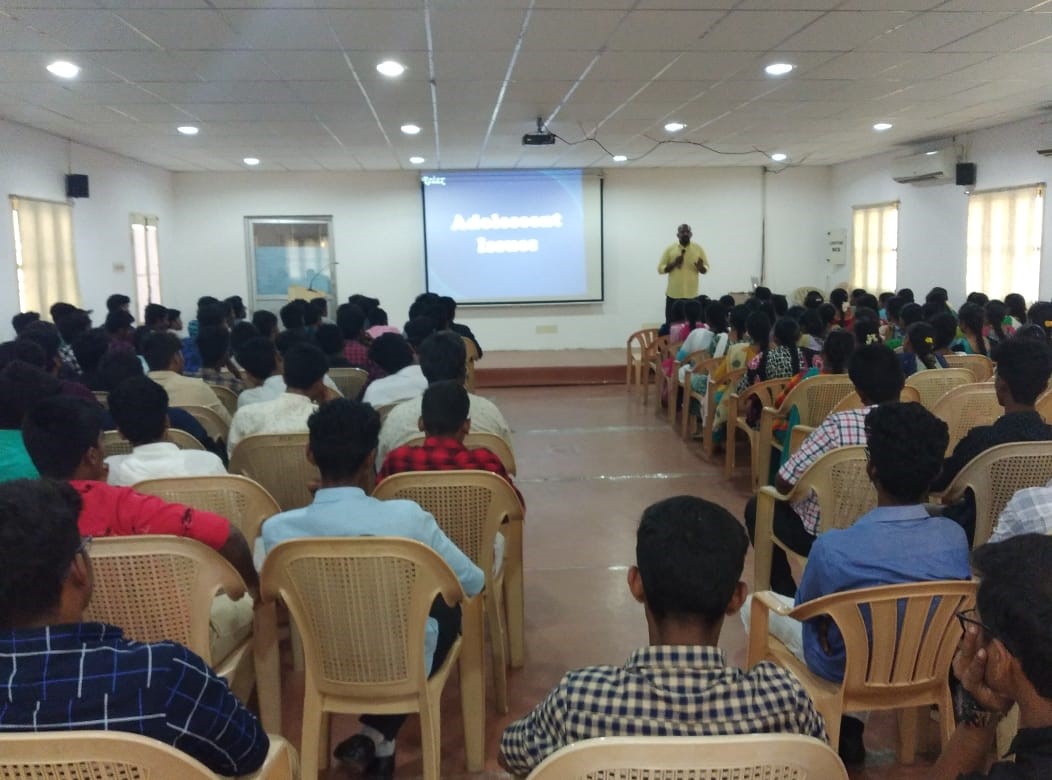
Dr.T.Ragunath,Psychiatrist, P.S.R.Engineering College,Sivakasi Counseling to the participants, on the topic of “World Suicide Prevention Day” dated on 10.09.2021.
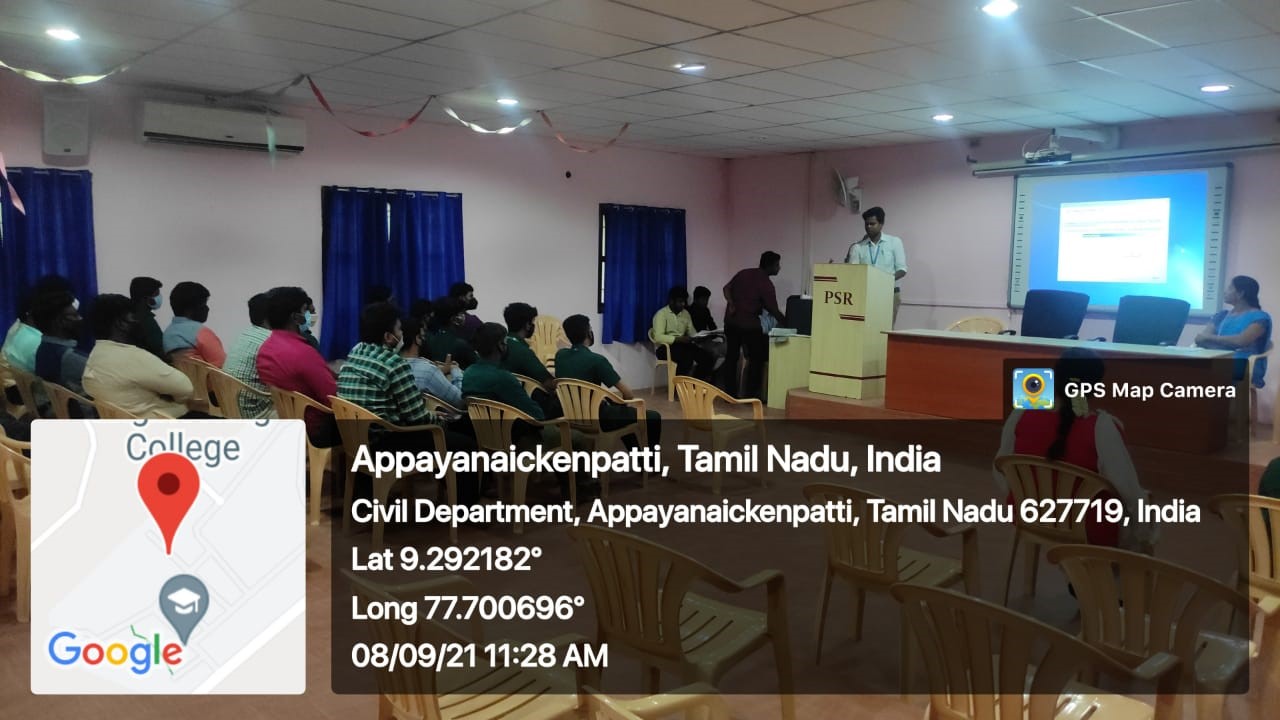
Dr.R. Prem Kumar, Assistant Professor, Department of English, P.S.R.Arts and Science College, Sivakasi. Address to the participants, on the topic of “International Literacy Day” dated on 08.09.2021.
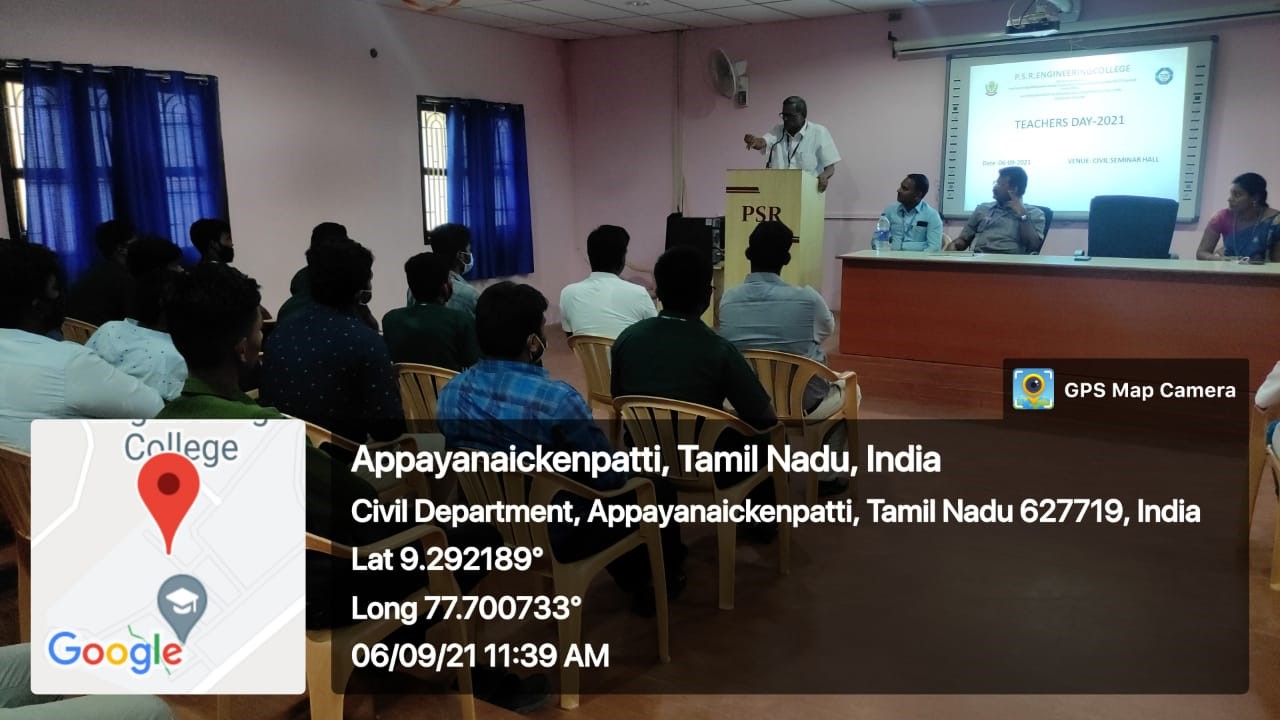
Dr.M. Gopalsamy, Professor & Academic director of P.S.R. Arts and Science College, Sivakasi, addressed to the participants on the event of “TEACHER’S DAY” on 6.09.2021.
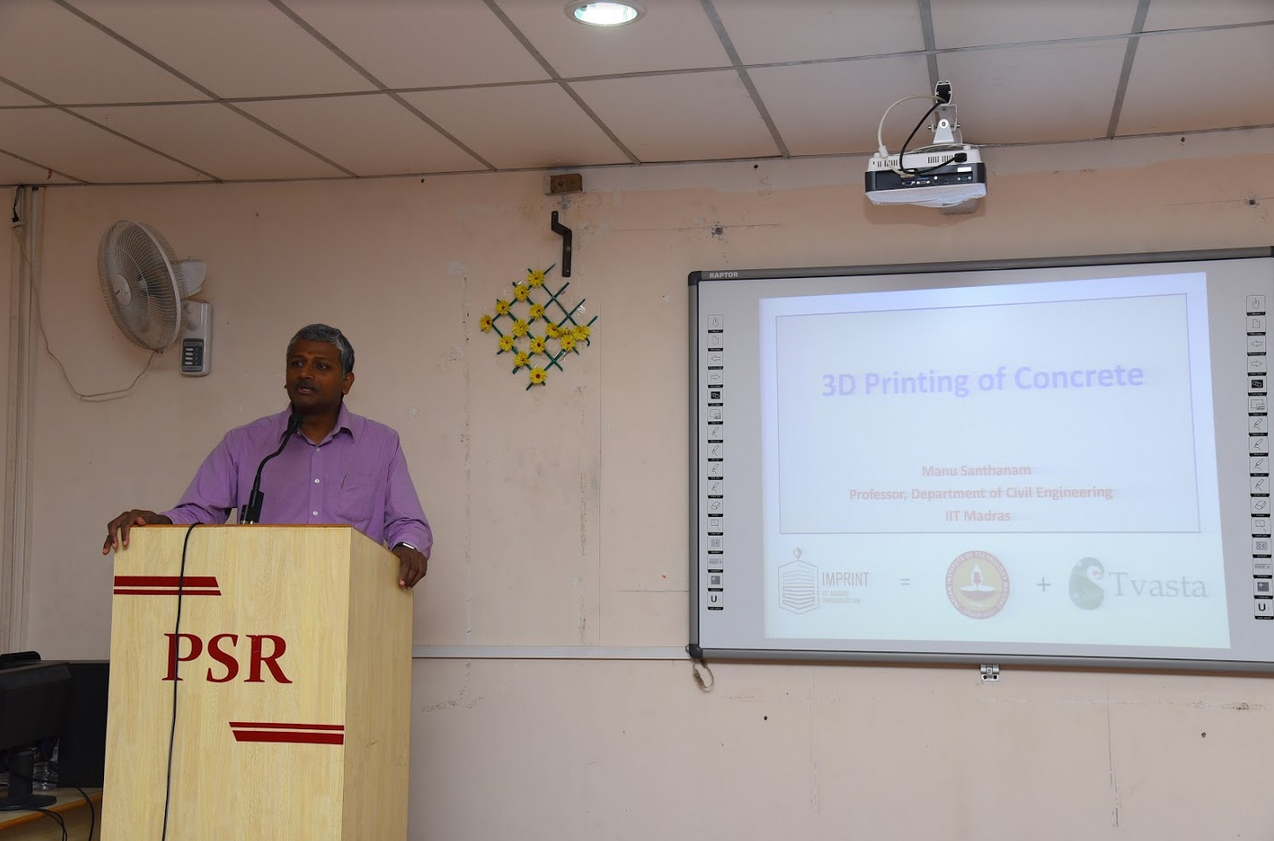
One day Seminar on “3D printing of Concrete” on 10.02.2021. The speaker of this program is Dr. Manu Santhanam, Professor, Building Construction and Management Division, IIT Madras.
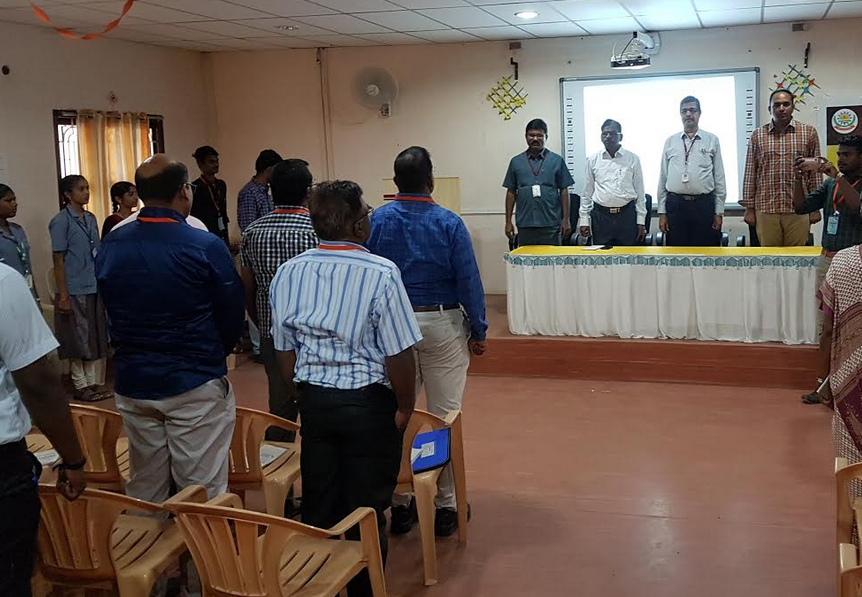
One day workshop titled on “Construction errors and remedies” on 21.01.2021. The speaker of this program is Dr. M. Kaarthik, Professor, Department of Civil Engineering, CIT, Coimbatore.
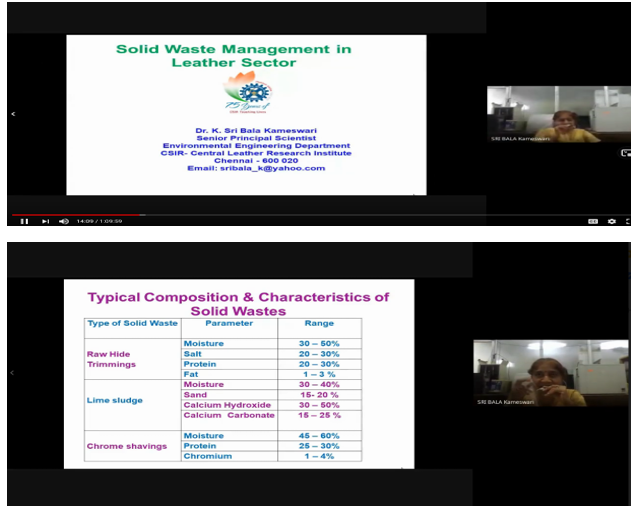
AICTE Sponsored One Week Online STTP titled on “Industrial and Municipal Waste Management for Green India” – Series III” on 05.10.2020 to 10.10.2020. The speakers are invited from the various Expertized area.
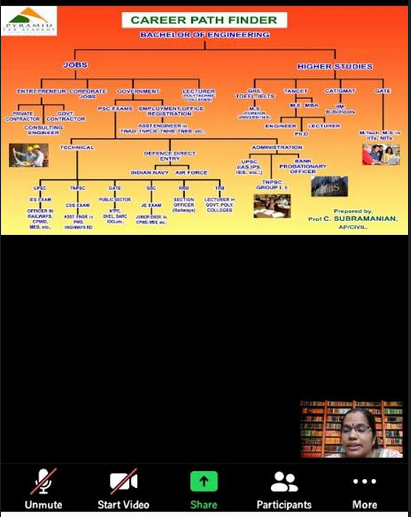
Webinar Amid Covid 19 Pandemic titled on “Civil Engineering Jobs” on 05.09.2020. The speaker of this program is Mrs.M.Karpagam. The Director, Pyramid Academy, Karaikudi.
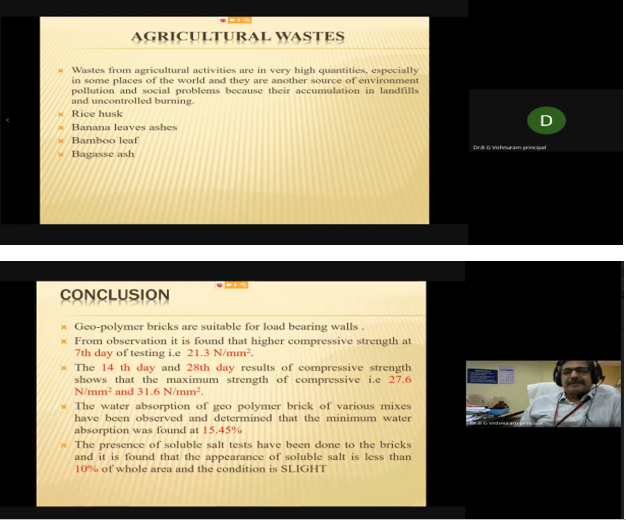
Webinar Amid Covid 19 Pandemic titled on “Effective Utilization of Industrial and Municipal Solid Waste to Develop Futuristic Concretes” on 03.09.2020. The speaker of this program is Dr. B. G. Vishnuram, Professor & Principal, P.S.R. Engineering College, Sivakasi.
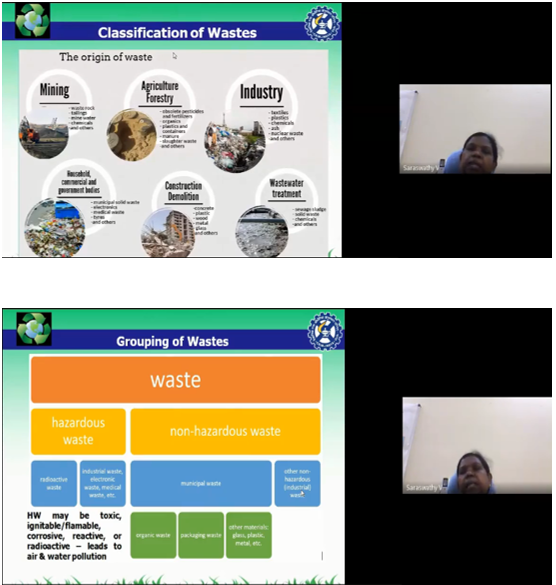
Webinar Amid Covid 19 Pandemic titled on “Corrosion mechanism on concrete” on 01.09.2020. The speaker of this program is Dr. V. Saraswathy, Chief Scientist, CECRI, Karaikudi, Tamil Nadu, India.
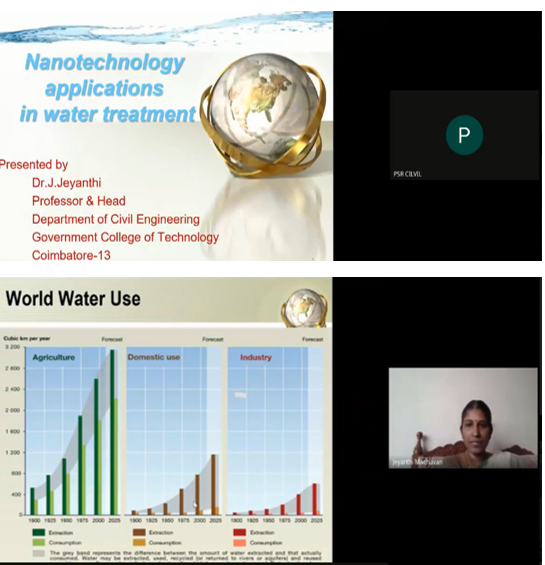
AICTE Sponsored One Week Online STTP titled on “Industrial and Municipal Waste Management for Green India – Series II” on 24.08.2020 to 29.08.2020. The speakers are invited from the various Expertized area.
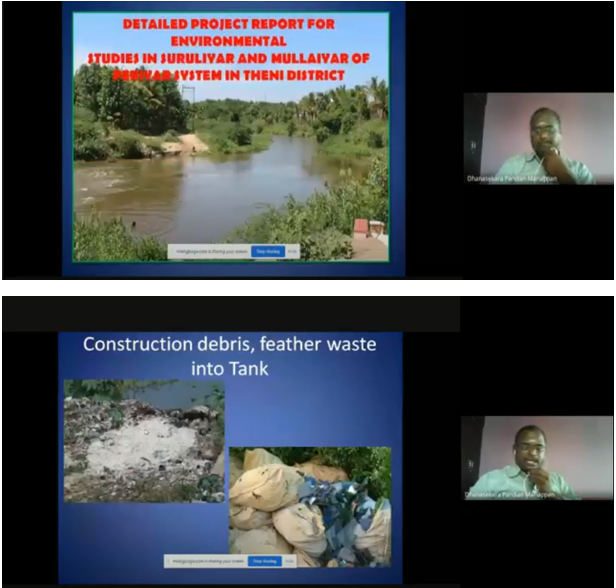
1. Webinar Amid Covid-19 Pandemic titled on “On Site Challenges on Waste Treatment and Disposal” on 28.07.2020. The speaker of this program is Mr. M.Dhanasekara Pandian, Assistant Engineer, PWD/RWD, Environmental Cell, Subdivision, Tirunelveli, Tamilnadu, India.
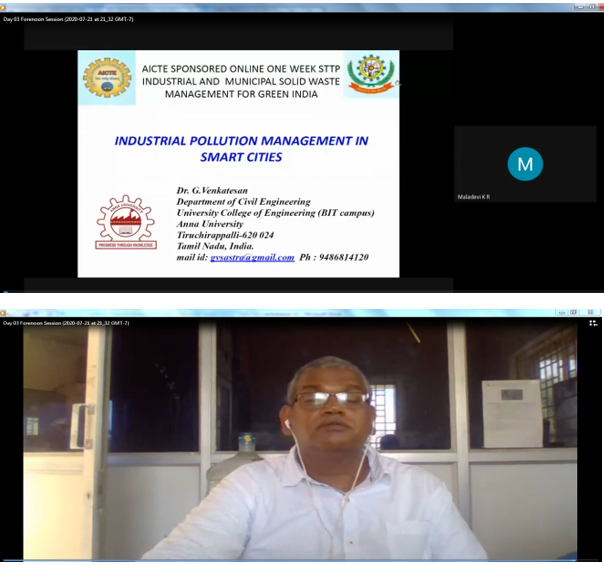
AICTE Sponsored One Week Online STTP titled on “Industrial and Municipal Waste Management for Green India – Series I” on 20.07.2020 to 25.07.2020. The speakers are invited from the various Expertized area.
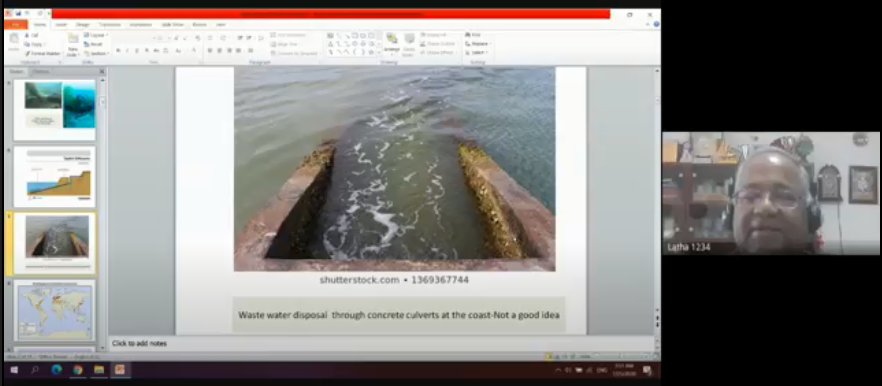
Webinar Amid Covid 19 Pandemic titled on “Challenges For Engineers in the Ocean and Coastal Infrastructure Developments” on 05.06.2020. The speaker of this program is Dr.S.Neelamani, Senior Research Scientist, Kuwait Institute for Scientific Research, Kuwait.
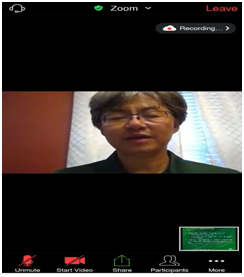
Webinar Amid Covid-19 Pandemic titled on “Forensic Engineering” on 01.06.2020. The speaker of this program is Dr.Shen-En-Chen, Ph.D, P.F,Civil and Environmental Engineering, University of North Calorina, USA.
Various Activities

Workshop on Non Destructive Testing of Concrete on 28.06.2019 by Dr. K. Subramanian, Professor, PSR Engineering College.

Seminar on Deep Foundation on 06.07.2019 by Dr. R. Ayyothiraman, Professor Department of Civil Engineering, IIT Delhi.

Guest Lecture on Durability of Concrete Structures on 25.07.2019 By Dr. V. S. Saraswathy, Chief Scientist Corrosion and material Protection, CECRI, Karaikudi.

Alumni Interaction Program on 08.08.2019 By Mr. V. Vigneshraj, Site Civil Engineer, Mclaren Construction LLC, Dubai.

Guest Lecture on Building Analysis and Design on 26.08.2019 By Dr. S. Nagan, Professor, Department of Civil Engineering, Thiagarajar College of Engineering, Madurai.

Workshop on Mix Design of Concrete on 05.09.2019 By Dr. K. Muthukumaran, Professor Department of Civil Engineering, NIT Trichy.

AICTE Sponsored One Week Short term Training Program on “ Advanced Concrete Technology†on 09.12.2019 – 14.12.2019

Awareness Program on Fire Safety on 29.11.2019 By Mr. M. Navaneetha Ayyanar, Managing Director, Nambi Fire Association, Sivakasi.

Workshop on Digital Surveying Using Total Station on 29.01.2018 to 02.02.2018. The speaker for this function is Mr. A. Anandhan Trainer, Lawrence & Mayo.

PSR Engineering College, Sivakasi Conducted on Mega Job Fair on 26.05.2018 At Pettai, Muslim School, Kadayanallur.

Inauguration of Civil Engineering Department on 28.07.2018. The speaker for this function is Dr. K. Renji, Group Director Structures, ISRO, Bangalore.

FDP on Outcome based Education and AICTE modal curriculum on 28.07.2018(AN) by Dr. G. Sankara Subramanian, Professor and Head of the Department of Civil Engineering, PSG College of Technology, Coimbatore.

Seminar on Career Opportunities for Civil Engineering at ISRO on 27.07.2018 by Ms. Josephine Kelvina Florence Senior Scientist, ISRO, Bangalore.

One day Workshop on Innovative user of home litting Techniques on 21.08.2018 by Mr. A. Anbil Tharmalingam, Sri Meenakshi Associate, Madurai.

Seminar on Modern Construction Equipments in Civil Engineering on 28.08.2018. The Speaker of this function is our Alumni of (2012-2016) batch Mr. M. Mahadevan.

Design Competition in Association with CADD Center for Final Year Civil Engineering Students on 20.09.2018.

Hands on Training on Remote Sensing and Geographical Information System on 24.09.2018 and 25.09.2018.

Guest Lecture on Technical Paper Writing On 14.11.2018 by Dr. K. Ganesan Principal PSR Engineering College Sivakasi.

One day workshop on Primevera on 21.06.2017. The speaker for this function is Mr. Alagar Devan, Trainer, CADD Master 5C, Madurai.

One day workshop on emerging trends in building information modelling software on 28.06.2017. The speaker for this function is Mr. R. Sudharsan, Senior Engineer, business support service, CADD centre training service private limited, Chennai.

One day workshop on analysis and design of building structures on 07.07.2017. The speaker for this function is Dr. S. Nagan, Associate Professor, Department of Civil Engineering, Thiyagaraja College of Engineering, Madurai.

One day workshop on fire safety awareness programme on 13.07.2017. The speaker for this function is Mr. M. Manikandan, Asst. District Fire Officer, Sivakasi.

Seminar on Career Guidan and Opportunities in Indian Army for Civil Engineering Graduates on 10.08.2017. The speaker for this function is Ex. Karthigairajan Chief Engineer (Refd) MES.

One day Workshop on ETABS and MSP on 23.08.2017. The speaker for this function is Mr. R. Sudharsan, senior Engineer business support service CADD Center Training Service Pvt, Ltd, Chennai.

One day Workshop on Digital Surveying using Total Station on 06.12.2017. The speaker for this function is Mr. A. Anandhan Trainer, Lawrence & Mayo.

Seminar on Recent Trends in Interlinking of Rivers in India on 22.07.2016. The speaker for this seminar is Prof. A.C. Kamaraj, Chairman, NAWAD Tech, Member, Expert Committee, Interlinking of Rivers. Government Of India, Specialist In Water Management & Irrigation.
Syllabus
Academic study is a collaborative educational process where the students and staff are communicating to ensure speculative and career goals. Both the parties are making their part to a greater extent to reach success.
ACADEMIC REGULATIONS & SYLLABUS
| REGULATIONS | CURRICULUM & SYLLABI - UG | CURRICULUM & SYLLABI - PG |
|---|---|---|
| REGULATIONS 2012 | CURRICULUM & SYLLABI 2012 | CURRICULUM & SYLLABI 2012 |
| REGULATIONS 2016 | CURRICULUM & SYLLABI 2016 | CURRICULUM & SYLLABI 2016 |
| REGULATIONS 2019 | CURRICULUM & SYLLABI 2019 | CURRICULUM & SYLLABI 2019 |
RESEARCH CENTRE
Department of Civil Engineering has been recognized as Research Centre by Anna University, Chennai since 2015.
RESEARCH ACTIVITIES
| S.No | DETAILS | TOTAL |
| 1. | Faculty Strength | 21 |
| 2. | No of Faculty with Ph.D | 5 |
| 3. | No of Faculty Members Pursuing Ph.D | 9 |
| 4. | No of Recognized Research Supervisors | 3 |
| 5. | No. of Research Scholars in our Research Centre | 15 |
| 6. | List of Scholars Completed their Ph.D | 6 |
RECOGNIZED RESEARCH SUPERVISORS
| S.No | Reference No | Supervisor Name | Designation | Research Area | |
| 1. | 9910144 | Dr.K. SUBRAMAMANIAN | Professor and Director (Academic) | Concrete Technology, Construction Management, Stability of Structures and Dynamics | subramaniancivil@psr.edu.in |
| 2. | 2310170 | Dr.B.G.VISHNURAM | Professor and Principal | Concrete Technology & Earthquake Resistant Structures |
principal@psr.edu.in |
| 3. | 2310130 | Dr.M.SHAHUL HAMEED | Professor and Head
Dean(Research) |
Concrete Technology & Environmental Engineering |
hod_civil@psr.edu.in |
ON GOING RESEARCH
|
S.No |
Name of the Scholar |
Register No |
Area of research |
Name of the Supervisior |
Status |
|
1 |
Mr.R.Thangaraj |
18141891178 |
Concrete Technology |
Dr. B.G.Vishnuram |
Provisional Registration Confirmed |
|
2 |
Mr.T.KarthickPrabhu |
1212169735 |
Pavement Design |
Dr.K.Subramanian |
Provisional Registration Confirmed |
|
3 |
Ms.V.Suguna |
1324169711 |
Concrete Technology |
Course Work |
|
|
4 |
Ms.K.NithyaPriya |
1424139104 |
Geopolymer Concrete |
Provisional Registration Confirmed |
|
|
5 |
Mr.L.Arun Raja |
1614189149 |
Concrete Technology |
Dr.M.Shahul Hameed |
Provisional Registration Confirmed |
|
6 |
Mrs.A.Dhanalakshmi |
17241891176 |
|||
|
7 |
Mr.K.Mahendran |
16141897123 |
Soil Mechanics |
||
|
8 |
Mr.S.Karthik Ragunath |
1613189168 |
Construction Management |
||
| 9 | Mr.C.John Suresh Kumar |
17141791164 |
Soil Stabilization |
Provisional Registration Confirmed |
|
|
10 |
Mr.S.Suriyaprakash |
17141897169 |
Light Weight Concrete |
Provisional Registration Confirmed |
|
|
11 |
Ms.A.Dhanalakshmi |
21221891144 |
Fibre Reinforced Foam Concrete |
Granted Registration Confirmed |
|
|
12 |
Mrs.B.BabyShamini |
21221891154 |
Geopolymer Concrete |
Granted Registration Confirmed |
|
|
13 |
Mr.H.MohamedThameem Ansari |
20211181 |
Structural Sections for Lattice Towers |
Granted Registration Confirmed |
FACULTY INTELLECTUAL PROPERTY RIGHTS
| Name of the Inventors |
Application Number |
Title of the Patent Applied |
| Dr.M.Shahul Hameed Dr.B.G.Vishnuram Ms.A.Dhanalakshmi Mr.L.Arun Raja Mr.S.Lakshmi Narayanan Mr.R.KarthikRagunath Mrs.N.Saranya Mr.S.VijayaBaskar |
201941012315 A |
Prefabricated Ferro-Foam Concrete Doors |
| Dr.M.Shahul Hameed Ms.A.Dhanalakshmi Mr.K.Mahendran Mrs.A.Dhanalakshmi Mr.M.Venkada Subramanian Mr.G.Baskar Singh Mr.R.Manoj Guru |
201941012318 A |
Eco Friendly Roof Weathering Tiles |
| Dr.M.Shahul Hameed Dr.B.G.Vishnuram Mr.L.Arunraja Mrs.A.Dhanalakshmi Mr.S.KarthikRagunath Dr.K.M.BasanthBabu Ms.A.Dhanalakshmi Mr.G.Baskar Singh Mr.S.Nagamani Mrs.K.Ranjitha Mr.R.Manoj Guru Mr.R.Kumar Mr.P.Rajesh Mr.M.AhamedAzik Ali Mr.N.Radhakrishnan |
201941004595 A |
Low Cost Eco-friendly Fibre False Ceiling |
| Dr.M.Shahul Hameed Dr.B.G.Vishnuram Mrs.A.Dhanalakshmi Mr.S.KarthikRagunath Mr.L.Arunraja Ms.A.Dhanalakshmi Mr.G.Baskar Singh Mr.S.Nagamani Mr.R.Manoj Guru Mr.M.Dhivakar Mr.R.Kumar Mr.P.Rajesh Ms.S.Sowmya Mr.M.AhamedAzik Ali Ms.PA.VelciShridevi |
202141004597 A |
Eco-Efficient Geopolymer Bricks |
| Dr.M.Shahul Hameed Dr.B.G.Vishnuram Mr.S.KarthikRagunath Mr.L.Arunraja Mrs.A.Dhanalakshmi Dr.K.M.BasanthBabu Ms.A.Dhanalakshmi Mr.G.Baskar Singh Mr.S.Nagamani Mrs.K.Ranjitha Mr.M.Dhivakar Mr.R.Kumar Ms.S.Sowmya Mr.N.Radhakrishnan Ms.M.Prema |
202141004603 A |
Fiber Reinforced Rubber Weathering Joint for Pavement |
FUNDED PROJECTS
| S.No. |
Name of the Principal Investigator |
Funding Agency |
Title of the Project |
Amount Sanctioned |
Year of Award |
|
1
|
Dr.M.Shahul Hameed |
AICTE |
STTP – Industrial and Municipal Solid Waste Management for Green India |
Rs.3,63,600 |
2019 |
|
1
|
AICTE |
STTP – Advanced Concrete Technology |
Rs.2,75,000 |
2018 |
|
|
3
|
AICTE-ISTE |
Induction Programme – Safe Design and Construction of High Rise Buildings |
Self Supporting Scheme |
2018 |
|
|
4
|
TNSCST |
Project – Treatment of effluents fro dyeing industries using natural adsorbents |
Rs.10,000 |
2018 |
|
|
5
|
TNSCST |
Project – Efficient Use of Plastic Materials as Sand Replacement in concrete†for the year |
Rs.10,000 |
2017 |
VALUE ADDED GROUP
| S.No. | Group | Faculty Name | Activities |
| 1 | Structural Engineering | Dr. B.G.Vishnuram Mrs.A.Dhanalakshmi Mr.R.Kumar Mr. N. Radhakrishnan |
|
| 2 | Construction Engineering | Dr.M.Shahul Hameed Ms.A.Dhanalakshmi Ms.S.Sowmya |
|
| 3 | Transportation Engineering | Dr.K.Subramanian Mrs.K.Ranjitha Mr.S.Nagamani |
|
| 4 | Surveying | Mr.G.Baskar Singh Mr.R.Manojguru Ms.M.Prema |
|
| 5 | Geotechnical Engineering | Dr.KM.Basanth Babu Mr.M.Ahamed Azik Ali Ms.S.Karthika |
|
| 6 | Environmental Engineering | Mr.S.Karthik Ragunath Mr.P.Rajesh Ms.J.Swathi |
|
| 7 | Water Resource Engineering | Mr.L.Arun Raja Mr.M.Dhivakar Ms.PA.Velci Shridevi |
|
Responsibilities:
Academics:
- Classroom presentation
- Laboratory Instructions
- Development Learning of Resource Materials & Laboratory Development
- Student Assessment & Evaluation including Examination work of University.
- Participation in Co-curricular & extracurricular activities
- Student’s guidance, counseling& helping in their personal, ethical, moral, and overall character development
- Keeping abreast of new knowledge and skills, help to generate new knowledge and help dissemination of such knowledge through books, publications, seminars, handouts, etc.
- Continuing Education Activities Self-development through upgrading qualifications, Experience & Professional activities
Research Consultancy:
- Research development activities & Research guidance
- Industry sponsored projects
- Providing consultancy and testing services
- Promotion of industry–institution interaction and R & D
Academic / Administration:
- Academic and Administrative management of the institution
- Policy planning, monitoring & evaluation, and promotional activities; both at the department level and institution level
- Design and development of a new programme.
- Preparing projects for funding in areas of R&D work, laboratory development, modernization, expansion, etc
- Administration both at departmental & institutional levels
- Development, administration, and management at Institutional levels
- Monitoring and evaluation of academic and research activities
- Participation in policy planning at the Regional / National level for the Development of Technical Education
- Helping mobilization of resources for the Institution
- Develop, update and maintain MIS
- Plan and implement Staff Development activities, conduct Performance Appraisal
- Maintain Accountability
- Extension / Industrial Connectivity
- Interaction with Industry and Society
- Participation in Community services
- Providing R&D support and consultancy services to Industry and other user agencies
- Providing non-formal modes of education for the benefit of the Community
- Promotion of Entrepreneurship and Job rotation
- Dissemination of knowledge
- Providing Technical support in areas of social relevance
Apart from the above duties, any other relevant work is assigned by the Dean of the respective schools
Publications
The publications from the college range from creative writing emphasis to technology-related subjects that makes basic training to the students. Significant publications come under the category of journalistic writing, symposiums, internships, and externships, etc.
JOURNAL PUBLICATIONS: 2022-2023:
- Surya Abisek Rajakarunakaran, Arun Raja Lourdu, Suresh Muthusamy, Hitesh Panchal, Ali Jawad Alrubaie, Mustafa Musa Jaber, Mohammed Hasan Ali, Iskander Tlili, Andino Maseleno, Ali Majdi, Shahul Hameed Masthan Ali, Prediction of strength and analysis in self-compacting concrete using machine learning based regression techniques, Advances in Engineering Software, Nov 2022, DOI: https://doi.org/10.1016/j.advengsoft.2022.103267.
- Dhanalakshmi Ayyanar, B.G. Vishnuram, P. Muthupriya, M. Indhumathi Anbarasan, An experimental investigation on strength properties and flexural behaviour of ternary blended concrete, Materials Today: Proceedings, https://doi.org/10.1016/j.matpr.2023.03.020, (2023).
- Dhanalakshmi, A., M. Shahul Hameed, Strength Properties of Concrete Using Marble Dust Powder, East Asian Journal of Multidisciplinary Research (EAJMR) , ISSN 2828-1519, Vol. 1, No. 11, Dec 2022 : 2521-2530 DOI: https://10.55927/eajmr.v1i11.1785.
- N. Puvaneshwaran, E.Vipurajan, A.Dhanalakshmi, Dr.M.Shahul Hameed., J.Jeyaseela J., Experimental Investigation on Strength Properties of Foam Concrete, East Asian Journal of Multidisciplinary Research, April 2023, https://doi.org/10.55927/eajmr.v2i4.3861.
- A.Dhanalakshmi, Dr.M.Shahul Hameed, S.Sowmya, PA.Velci Shridevi, An Experimental Study on Fibre Reinforced Foam Concrete Using Hybrid Fiber, E3S Web of Conferences, Volume 387, May (2023), https://doi.org/10.1051/e3sconf/202338703003.
- A.Dhanalakshmi, J. Jeyaseela, S. Karthika, A. Leema Margret., An Experimental Study on Concrete with Partial Replacement of Cement By Rice Husk Ash and Bagasse Ash, E3S Web of Conferences, 387, https://doi.org/10.1051/e3sconf/202338703004, (2023).
JOURNAL PUBLICATIONS: 2021-2022:
- Mahendran.K., Shahul Hameed,M., A Research Analysis on Mechanical, Physical and Chemical Characteristics of the Materials Used for Pile Foundation, International Journal of Civil, Structural, Environmental and Infrastructure Engineering Research and Development (IJCSEIERD), ISSN:2249 7978, Vol. 12, Issue 1, Jun 2022., http://www.tjprc.org/publishpapers/2-11-1641387964-2IJCSEIERDJUN20222.pdf.
- Mahendran.K., Shahul Hameed,M., Experimental Investigation of Behaviour of Fiber Reinforced Concrete Pile in Medium Dense Sand, Volume 12, Issue 1, Jun 2022, http://www.tjprc.org/publishpapers/2-11-1644040260-IJCSEIERDJUN20224.pdf.
- Nagamani, S., Hemavathi, R., Dhanalakshmi, A., GIS Based Intelligent Transportation System for Coimbatore Corporation.,Pensee, ISSN: 0031-4773, Issue 6, 2021.
- Prema M, Nagamani S., Certain Exploration on Light Weight Concrete by Using Pumice, Journal of Advanced Cement & Concrete Technology, https://zenodo.org/record/5991606#.Ymoa69NBzIV.
- PA.Velci Shridevi, M.Shahul Hameed, An Experimental Investigation on Influence of Rebar Corrosion incorporated with Sisal Fibre, Journal of Building Construction, https://zenodo.org/record/6379447#.YmobbtNBzIV.
- Arun Raja, L., Shahul Hameed, M., Non destructive Studies on Light Weight Self Compacting Concrete Using Filler Materials,The e-Journal of Nondestructive Testing, ISSN 1435-4934, June 2021.
- KarthikRagunath, S., Arun Raja, L., Shahul Hameed, M., Kavya, R., Corrosion studies on the bond behavior of fibre reinforced concrete, International Journal of Science Technology & Engineering, Volume 7, Issue 11, May 2021, ISSN (online): 2349-784X, June 2021.
- Shahul Hameed, M.,Dhanalakshmi, A., Daniel Jeba Kumar, B., Experimental Study on Foam Concrete, International Journal of Research in Engineering and Science (IJRES), Volume 9, Issue 6, June 2021.
- Dhanalakshmi, A., Shahul Hameed, M.,Veera Ashok, B., Experimental Investigation on Strength Properties of Concrete by Using Graphene in International Journal of Creative Research Thoughts (IJCRT), Volume 9, Issue 6, ISSN: 2320-2882 June 2021.
- Dhivakar, M., Nagamani, S., Sowmya, S., Experimental Study on Dairy Wastewater Treatment by Phytoremediation Process, SSRG International Journal of Recent Engineering Science, Volume 8, Issue 3, , ISSN: 2349-7157 /doi:10.14445/23497157/IJRES-V8I3P102, June 2021.
- Dhanalakshmi, A., Shahul Hameed, M., Influence on the Mechanical Properties of Quartz Sand and Marble Sludge Powder as a replacement for fine aggregate in High Strength Self Compacting Concrete Materiali in Tehnologije, ISSN 1580-2949, Volume 55, Issue 4, doi:10.17222/mit.2021.065, July 2021.
- Dhivakar, M., Vishnuram, B.G., Investigation of Geo polymer Concrete Using Waste Plastic Powder as partial Replacement for Fine Aggregate, Journal of Ceramics and Concrete Sciences, Volume 6, Issue 2, July 2021.
- Dhanalakshmi, A., Shahul Hameed, M.,VelciShridevi, PA., Swathi, J., Strength Characteristics on Partial Replacement of fine Aggregate by Ceramic Waste in Concrete to avoid Land Pollution, Journal of Ceramics and Concrete Sciences, ISSN: 2582-1938, Volume-6, Issue-2, July 2021.
- Prema,M., Nagamani, S., Dhanalakshmi, A., An Experimental Analysis to Study the Effect of Clay and Flyash as a Supplementary Cementitious Material, Journal of Civil and Construction Engineering, ISSN: 2457-001X, Volume-7, Issue-2 July 2021.
- Dhanalakshmi, A., Shahul Hameed, M.,Vishnuram, B.G., Strength Properties of Geopolymer Concrete with Various Molar Concentrations (8m to 16m), Journal of Civil and Construction Engineering, ISSN: 2457-001X, Volume-7, Issue-2, July 2021.
- Radha Krishnan, N., Karthika, N., Project on Experimental Investigation on Flexural Behavior of Self Compacting Concrete Journal of Ceramics and Concrete Sciences, ISSN: 2582-1938, Volume-6, Issue-2, July 2021.
- Radha Krishnan, N., Karthika, N., Study on Reinforced Concrete (RC) Beam using Composite Material Under Flexural Loading Journal of Advanced Cement & Concrete Technology, Volume 4, Issue 2, DOI: https://doi.org/10.5281/zenodo.5155338, July 2021.
- Vidhyalakshmi, S., Nagamani, S., Dhivakar, M., Experimental Investigation on Fiber Reinforced Concrete with Partial Replacement of Fine Aggregate with Red Soil and Using Polypropylene Fiber Journal of Advanced Cement & Concrete Technology, Volume 4, Issue 2, DOI: https://doi.org/10.5281/zenodo.5163191, July 2021.
- Karthika, N., Radha Krishnan, N., Design of Modern Sanitary Landfill Journal of Environmental Engineering and its Scope, Volume 4, Issue 2, DOI: http://doi.org/10.5281/zenodo.5141269, July 2021.
- Sowmya, S., Velcishridevi, PA., Shahulhameed, M., UPV Test on Concrete Using Granite Waste Powder as Partial Replacement to Cement, The e-Journal of Nondestructive Testing, ISSN 1435-4934, July 2021.
- Nagamani, S., Prema, M., Dhanalakshmi, A., Analysis of Factors Causing Disputes Between Owners and Contractors in Apartment Construction Projects Journal of Sustainable Construction Engineering and Project Management, Volume 4 Issue 2, DOI: http://doi.org/10.5281/zenodo.5075182, July 2021.
- Sowmiya, B., Nagamani, S., Prema, M., Optimization of Biogas Production Using Food Waste by Floating Drum Type Anaerobic Reactor, Journal of Environmental Engineering and its Scope, Volume 4 Issue 2 DOI:https://doi.org/10.5281/zenodo.5171962, Aug 2021.
- G., Prema, M., Nagamani, S., An Experimental Attempt to Study on Self Compacting Concrete by Partial Replacement of Coarse Aggregate, Journal of Sustainable Construction Engineering and Project Management, Volume 4, Issue 2, DOI: https://doi.org/10.5281/zenodo.5378761, Sep 2021.
- Nagamani, S., Maha Vidya, S., Atchaya, R., Stabilization of Black Cotton Soil Using Silica Fume and Coconut Coir Ash, Journal of Geotechnical Studies, Volume-6, Issue-3, e-ISSN: 2581-9763, Sep 2021.
- Nagamani, S., Madhumitha, M., Dhanalakshmi, A., Groundwater Quality Modeling of Tirupur City Using GIS, Journal of Remote Sensing GIS & Technology, Volume 7, Issue 3, Sep 2021.
- Nagamani, S., Dhivakar, M., Leema Margret, A., Dhanalakshmi, A., Experimental Investigation on Corrosion Control in Concrete, Journal of Engineering Analysis and Design, Volume 3 Issue 2 DOI: https://doi.org/10.5281/zenodo.5535672, Sep 2021.
- Shahul Hameed, M., Vishnuram, BG., Dhanalakshmi, A., Assessment of Groundwater Quality in Sevalpatti Village, Journal of Water Resources and Pollution Studies, e-ISSN: 2581-5326, Volume-6, Issue-3, Sep 2021.
- Nagamani, S., Elangovan , K., A Review on Geospatial Technology Application in Urban Growth Dynamics of Cities, Natural Volatiles and Essential Oils, Volume 8, Issue 5, 3404-3411.
Journal Publications: 2020-2021
- Arun Raja, L., Shahul Hameed, M., “Non Destructive Studies on Fibre Reinforced Self Compacting Concrete Ductile Beamsâ€Journal of Nondestructive Testing, ISSN 1435 4934, June 2020.
- Dhanalakshmi. A., Dhivakar, M., Baskar Singh, G., “Experimental Investigation on Strength Properties of Concrete Using Silica Flourâ€International Research Journal of Engineering and Technology (IRJET), Volume: 07, Issue: 07, p-ISSN: 2395-0072, July 2020.
- Mahendran, K., Shahul Hameed, M.,“Non-Destructive Test Study On High Strength Reactive Powder Concrete†Journal of Nondestructive Testing, ISSN 1435 4934, June September 2020.
- VelciShridevi, PA., Ashok, M., Daniel Ronald Joseph, J., Dhanalakshmi, A., “An experimental study on corrosion initiative of infused reinforcing bar in concreteâ€, in IOP Conf. Series: Materials Science and Engineering 989 (2020) 012024, doi:10.1088/1757-899X/989/1/012024, September 2020.
- Sivakumar, S.,Suresh, T., Shobana,K.S., Baskar Singh, G., “Utilization of Coconut Shell and Bagasse Ash in Concrete for Sustainable Built Environmentâ€, Journal of Seybold Report, ISSN No: 1533-9211, Volume 15, ISSUE 9, September 2020.
- Baskar Singh, G., Dhanalakshmi, A., Dhivakar, M., “Study on RC Column Confined with Glass and Steel Fiber Reinforced Concrete†Advances in Civil and Structural Engineering, Volume 6, Issue 1, January 2021.
- Dhivakar, M., Kumar, R., Dhanalakshmi, A., Madhu, AK.,“ Experimental Study on Treatment of Pulp and Paper Industry Waste Water by using MBBR†Journal of Environmental Engineering and Studies, Volume-6, Issue-1 January 2021.
- Joseph Reffin, A., Karuppasamy, M., ,Manikandakumar, S., Baskar Singh, G., “An Experimental Study of Jute Fiber and Partially Added Fly Ash With Ordinary Portland Cement in Concreteâ€, in International Research Journal of Engineering and Technology(IRJET), Volume-08, Issue-03, p-ISSN: 2395-0072, Mar 2021.
- Kesavan, C., Dhinesh, M., BharathKumar, M., Dhanalakshmi, A., “An Experimental Investigation on Cellular Lightweight Concrete by Using Fiber†in International Research Journal of Engineering and Technology (IRJET), Volume 8, Issue 3, ISSN: 2395-0056, March 2021.
- Sivakumar, M.,Ramachandran, A.,Palaninathan, J., Ranjitha, K., “Investigation of Geopolymer Paver Blocks Using Plastic Wasteâ€, International Research journal of Engineering and Technology, Volume 8, Issue 3, ISSN: 2395-0056, March 2021
- Sobica, J., Arun Raja, L., “Effect of Filler Material on Physical, Mechanical and Microstructural Studies on Self Compacting Concreteâ€, International Research Journal of Engineering and Technology, Volume: 08 Issue: 03, ISSN: 2395-0072, Mar 2021.
- Karthikeyan, M., Muthupandian, R., GokulKanna, R., Arun Raja, L., “The Sorptivity and Weight Change Characteristics of Fiber Reinforced In Self Compacting Concreteâ€, International Research Journal of Engineering and Technology, Volume 8,Issue 3, ISSN: 2395-0072, Mar 2021.
- Arun Kumar, G., Muthu Kumar, G., AchariRajeshwar, P., Arun Raja, L., “Porosity and Mechanical Behaviour of Self Compacting Concreteâ€, International Research Journal of Engineering and Technology, Volume 8,Issue 3, ISSN: 2395-0072, Mar 2021.
- Pavithra, S., Priyadharshini, P., Sriharini, D., Dhanalakshmi, A., “Experimental Study on Pullout Behavoiur of High Strength Self Compating Concreteâ€, International Research Journal of Engineering and Technology (IRJET), Volume 8,Issue 3, ISSN: 2395-0072, Mar 2021.
- Swathi, J., Dhanalakshmi, A., VelciShridevi, PA., “Experimental Study on Hybrid Fibre in Concrete†in International Research Journal of Engineering and Technology (IRJET), Volume 8, Issue 3, ISSN: 2395-0056, March 2021.
- Divya Lakshmi, S., KanagaDurga, J., Niranjana, S., Aswitha, S., MadhanaBala , Padma Priya, S., “Investigation of the Soil Behaviour of Different Soil Samples in College Campus†in International Research Journal of Engineering and Technology(IRJET), Volume-08, Issue-03, p-ISSN: 2395-0072, Mar2021.
- Vishal,B.,Surya, S., Paramasundar, S.,Baskar Singh, G., “ Computation of Reduce Level Using Modern Survey Equipment at Sub-level from Vembakottai to P.S.R.Engineering College Sivakasi†in International Research Journal of Engineering and Technology(IRJET), Volume-08, Issue-03, p-ISSN: 2395-0072, Mar2021.
- Vishnuram, BG.,Kowsika, N., Lakshmi Prabha, A., Murugaveni, V., Shalini, K., “Strength Hardening of Flyash Based Geopolymer Concreteâ€, International Research Journal of Engineering and Technology, Volume 8, Issue 3, ISSN: 2395-0072, Mar 2021.
- Arunkumar, A., Arunkumar, M., Murugesan, S., Prema, M., “Experimental Investigation on Floating Concreteâ€, International Research Journal of Engineering and Technology, Volume 8, Issue 3, ISSN: 2395-0056, March 2021.
- Shalini, P., Sureka, S., Thenmozhi, R., Shahul Hameed, M., Dhanalakshmi, A., An Experimental Investigation on Fiber Reinforced Foam Concrete in International Journal of Scientific Development and Research (IJSDR), ISSN 2455 -2631, Volume 6, Issue 3, April 2021.
- Kumar, R., Shahul Hameed, M., Suveka. M., Varalakshmi, M., Experimental Investigation On Fiber False Ceiling Using Eps†in International Journal of Scientific Development and Research (IJSDR), ISSN 2455 -2631, Volume 6, Issue 3, April 2021.
- Arun Raja, L., Shahul Hameed, M.,Chandriga, P., “Experimental Investigation of Mechanical and Durability Evaluation of Hybrid Fiber Reinforced Self Compacting Concreteâ€, Journal of Ceramics and Concrete Sciences, April 2021.
- Arun Raja, L., Shahul Hameed, M,KarthikRagunath, S.,AnushyaBanu, a., “Impact Behaviour and Mechanical Properties of PET Fiber Reinforced Self Compacting Concreteâ€, International Journal of Science Technology & Engineering, Volume 7, Issue 11, ISSN (online): 2349-784X, May 2021.
- Dhanalakshmi, A., Shahul Hameed, M., Kumar, R., “Nondestructive Strength Evaluation of Geopolymer Concrete Using M-Sand†The e-Journal of Nondestructive Testing, ISSN 1435-4934, May 2021.
- Kumar, R., Dhanalakshmi, A., Shahul Hameed, M., “Non Destructive Test on Fiber Reinforced False Ceiling Using Expanded Polystyrene Sheets†The e-Journal of Nondestructive Testing, ISSN 1435-4934, May 2021.
- Ranjitha, K., Sowmya, S., Manojguru, R., “Review on Geopolymer behavior of Ferrocement Panelâ€, International journal of creative research thoughts, Volume 9, Issue 5, ISSN: 2320-2882, May 2021.
- VelciShridevi, PA., Dhanalakshmi, A., Swathi, J., “Effect of Industrial by-products as a Partial Replacement of Cement†in Journal of Advanced Cement & Concrete Technology, Volume 4, Issue 1, DOI: http://doi.org/10.5281/zenodo.4745504, May 2021.
Journal Publications: 2019-2020
- Josephine Kelvina Florence, S., Renji, K., Subramanian, K., “Estimation of strains in
composite cylindrical shells in a statisticalenergy analysis framework†Applied Acoustics 155 (2019) 453–462. - KarthikPrabhu.T, Subramanian.K,Jagadesh.P, Nagarajan.V, “Experimental Investigation On Concrete With Replacement Of Fine Aggregates With Steel Slag†Romanian Journal of Materials 2019, 49 (3), 394 -399.
- Arun Raja, L., ShahulHameed, M., “Experimental Investigation on ReronFibreReinforced Self Compacting Concrete using Silica Flour and M-Sandâ€. International Journal of Current Engineering and Scientific Research, Volume 6, Issue 12, ISSN (ONLINE:2394-0697), ISSN Print:2393-8374, DOI:10.2176/ijcesr, Dec 2019.
- Sounthararajan, VM., Sivasankar, S., BasanthBabu, K.M., Vinodh Kumar, R., “Sustainable Efficiency of Fly Ash with Fibre Composite Matrix on Volume Reduction in Flexural Rigidityâ€, Journal of Green Engineering, Jan 2020.
- Dhanalakshmi, A., Manoj Guru, R., Ranjitha, K., “Phytoremediation of E-Waste Using NicotianaTabacum&MoringaOleifera†International Journal for Scientific Research & Development (IJSRD), Volume 7, Issue 12, February 2020.
- Manoj Guru, R., Dhanalakshmi, A.,“Phytoremediation of E-Waste Using NicotianaTabacum†International Journal of Engineering Research and Application, Volume 10, Issue 03, March 2020.
- Dhivakar, M., Baskar Singh, G., Dhanalakshmi, A., “Characterization of Textile Wastewater and Treatment by Chemical Coagulation†International Journal for Scientific Research & Development (IJSRD), Volume 08, Issue 01, ISSN (online): 2321-0613, April 2020.
- Kumar, R.,Shahul Hameed, M.,Ayyapan, A., “Influence of Fibre Reinforcement on Strength and Toughness of Light Weight Concrete†International Journal of Science Engineering Development Research, Volume 05, Issue 04, April 2020.
JOURNAL PUBLICATIONS: 2018-2019
- KarthikRagunath, S., Shahul Hameed, M., “Ranking of Key Delay Factors In Multi Storey Building Projects†International Research Journal Of Engineering and Technology(IRJET), Volume 5, Issue 6, June 2018.
- Arun Raja, L.,Shahul Hameed, M., “Durability Studies of Fiber Reinforced Self Compacting Concrete with Alccofine†International Journal of Science Technology and Engineering(IJSTE), Volume 4, Issue 12, June 2018.
- Arun Raja, L.,Shahul Hameed, M., Non Destructive Test on Fiber Reinforced Self Compacting Concrete†Journal of Non Destructive Test, June 2018
- Dhanalakshmi, A.,Shahul Hameed, M., “Review Study on High Strength Self Compacting Concrete†International Journal of Science Technology and Engineering(IJSTE), Volume 4, Issue 12, June 2018.
- Arun Raja, L.,Shahul Hameed, M., “Experimental Investigation on Rock filled Self Compacting Concrete†International Journal of Advanced Research in Basic Engineering Sciences and Technology(IJARBEST),Oct 2018.
- Arun Raja, L.,Shahul Hameed, M., “Study on Rock Filled Self Compacting Concrete†Journal of Ceramic and Concrete Sciences Vol-3, Issue 3, Dec 2018.
- Mahendran , K.,Shahul Hameed., M “Comparative Study of Physical and Chemical Properties of Geo-Textiles and Sub Grade Soil With CBR Used For Foundation Concrete, International Research Journal of Engineering and Technology, volume-05, issue -12, Dec2018, Issn – 2395-0056.
- Mahendran , K.,Shahul Hameed, M.,“Comparative Study of Stabilization of Black Cotton Soil and Clay Soil using Bagasse Ash and TyreCordâ€International Research Journal of Engineering and Technology,volume 06, issue-01, jan 2019,Issn-2395-0056.
- Dhanalakshmi, A., Shahul Hameed, M., “Physical Properties of High Strength Self CompactingConcrete using Silica fume and Quarry dust†International Journal of Advanced Research in Basic Engineering Sciences and Technology (IJARBEST),ISSN (ONLINE):2456-5717, Vol.4, Issue.11, November 2018.
- Dhanalakshmi, A.,Shahul Hameed, M., “Experimental Investigation of Self Compacting Concrete by PartiallyReplacing Fine Aggregate with Quartz Sand with Use of RecronFibre†International Research Journal of Engineering and Technology (IRJET), ISSN: 2395-0056Volume: 05 Issue: 11 | Nov 2018.
- KarthikRagunathS, Shahul Hameed M“Lean Thinking in Construction: Indian Construction Prospects†International Journal of Advanced Research in Basic Engineering. Science & Technology (IJARBEST),Vol.4, No.10, October 2018.
- Lakshmi Narayanan,S.,Shahul Hameed, M., “Physical Properties of High Performance using calcium Nitrate and Polypropylene Fiber in Marine Sand†International Research Journal of Engineering and Technology (IRJET), ISSN: 2395-0056, Volume: 05 Issue: 12, Dec 2018.
- John Suresh Kumar, C., Shahul Hameed, M., “A Review On Stabilization of Black Cotton Soil By Using Fly Ash, Marble Sludge And Brickdust Waste†International Journal of Engineering Development and Research, ISSN: 2321-9939, Volume6, Issue 3, 2018.
- Suriyaprakash, S., Shahul Hameed, M., “Review Study on Foam Concrete†International Journal of Advanced Research in Basic Engineering Sciences and Technology (IJARBEST), ISSN (online):2456-5717, Vol.4, Issue.12, December 2018.
JOURNAL PUBLICATIONS: 2017-2018
- Josephine Kelvina Florence, S., Renji, K., Subramanian, K., “Modal Density Of Honeycomb Sandwich Composite Cylindrical Shells Considering Transverse Shear Deformation†International journal of Acoustics and Vibration, Vol.23, No.1, 2018, https://doi.org/10.20855/ijav.2018.23.11241.
- Kumar, P., Sudalaimani, K., Shanmugasundaram, M., “An Investigation on Self-Compacting Concrete Using Ultrafine Natural Steatite Powder as Replacement to Cement†Advances in Material Science and Engineering,, https://doi.org/10.1155/2017/8949041.
- Gokulakrishnan, M.,Dhanalakshmi, A., “Analytical Study on Flexural Behaviour of Reinforced Geopolymer Concrete Beams†SSRG International Journal of Civil Engineering(SSRG-IJCE)-Special Issue ICETSST, 2018.
- Dhanalakshmi, A.,Gokulakrishnan, M., “Experimental Investigation on Stabilized Mud Blocks†International Journal for Scientific Research & Development(IJSRD), Volume 6, Issue 2,2018.
- Mahendran , K.,Shahul Hameed, M., “Experimental Investigation of Animal Bone Powder Replacing Cement in Concrete†International Journal of Innovative Research Technology, Volume 4, Issue 10, March 2018,ISSN: 2349-6002.
JOURNAL PUBLICATIONS: 2016-2017
- Nithyapriya, K., Subramanian, K., “Experimental investigation on flexural behaviour of Reinforced Geopolymer concrete with and without glass fibres†Asian Journal of Research in social sciences and humanities, Vol.7,No.1, Jan 2017.
-  Ranjithkuar, R., Subramanian, K., “Performance study of moving biofilm aerobic sequencing batch reactor (MBASBR) for the treatment of paper and pulp mill effluent†Journal of Advances in Chemistry†Vol.12,No.25,Dec 2016.
- KarthikPrabhu, T., Subramanian, K., “Experimental studies on rigid concrete pavement by using various cost effective and recycled materials for improving the strength and reducing the cost of pavement†Asian journal of Research in social sciences and humanities, Vol.6,No.12, Dec 2016.
- Kumar, P., Sudalaimani, K., Shahul Hameed, M., Sunantha, B., “Experimental Investigation on Strength Characteristics of Hybrid Fiber Reinforced Self Compacting Concreteâ€, International Journal of Science, Technology & Engineering (IJSTE) –Volume-3, Issue 5, Nov. 2016 ,ISSN(Online): 2349-784X.
-  Murugesan, V., Sunantha, B., Shahul Hameed, M., “Durability Study Of Bricks Using Marble Sludge Powderâ€, International Journal of Engineering Trends and Technology (IJETT) – Volume-41 Number-3, Pages 145-148, Nov. 2016 ,ISSN: 2231-5381.
- Parthiban, C., Sunantha, B., Shahul Hameed, M., “Effect of Nano Particle (Marble Sludge Powder) on Shear Strength of Soil to Strengthen the Vembakottai Damâ€,Indian Journal of Science and Technology, Vol 9(47), DOI: 10.17485/ijst/2016/v9i47/107623,December 2016, ISSN (Print) : 0974-6846, ISSN (Online) : 0974-5645.
- Subashini, R., Sonia, T.,Shahul Hameed, M., “Study on behavior of M-Sand Concrete using GGBS as Fillerâ€, International Journal of Science Technology & Engineering, Vol.3, Issue 05, November 2016, ISSN (online): 2349-784X.8. Arun Raja, L., Shahul Hameed, M., Kumar, P.KarthikRagunath, S., “Study onFlexural Behaviour of Concrete by Partially Replacing Fine Aggregate with E-Plastic Wasteâ€, International Journal of Engineering Research and Technology (IJERT), Vol. 5,Issue 11, November-2016, ISSN:2278-0181.
- Saranya, S.,Shahul Hameed, M., “Experimental Study on Mechanical and Durability Properties of Concrete Influenced By Waste Materials†SSRG International Journal of Civil Engineering (ICRTCETM-2017) – Special Issue – April 2017.
- Murugesan, V., Parthiban, C., Shahul Hameed, M., “Experimental Study on Cellular Lightweight Concrete Block (CLC Block)†SSRG International Journal of Civil Engineering (ICRTCETM-2017) – Special Issue – April 2017. 23488352 ISSN
- Parthiban, C., Murugesan, V., Shahul Hameed, M., “Strength and Durability Study of Bricks Using Marble Sludge Powder and Bottom Ash†SSRG International Journal of Civil Engineering (ICRTCETM-2017) – Special Issue – April 2017.
- Ramkumar, S., Shahul Hameed, M., “Tests And Criteria For Concrete Resistant To Chloride Ion Penetration†SSRG International Journal of Civil Engineering (ICRTCETM-2017) – Special Issue – April 2017.
- Logaraja, R., Shahul Hameed, M., “Thermal Resistant Concrete Under Elevated Temperature†SSRG International Journal of Civil Engineering (ICRTCETM-2017) –Special Issue – April 2017.
- Aparna, R., Dharani, R., Shahul Hameed, M., “Performance Assessment of Pervious concrete Using Marble Dust And Silica Fume†SSRG International Journal of Civil
Engineering (ICRTCETM-2017) – Special Issue – April 2017. -  Abusali, M., Balasubramaniyan, S., Shahul Hameed, M., “Experimental Study on Mechanical Properties of Porous Concrete Using Marble Powder†SSRG International Journal of Civil Engineering (ICRTCETM-2017) – Special Issue – April 2017.
-  Parthiban, C., Santhanakumar, Shahul Hameed, M., “Experimental Study on Embankment Slope Protection Using Plastic Waste, Marble Sludge Powder and Crusher Dust†SSRG International Journal of Civil Engineering (ICRTCETM-2017) – Special Issue – April 2017.
-  Murugesan, V., Vasanthaseelan, J., Shahul Hameed, M., “Effect of Nano Particle on Shear Strength of Soil†SSRG International Journal of Civil Engineering (ICRTCETM-2017) – Special Issue – April 2017.
-  Mahendran, K., Shahul Hameed, M., “Mechanical Properties of Fibre Reinforced High Performance Concrete Using Marine Sand†SSRG International Journal of Civil Engineering (ICRTCETM-2017) – Special Issue – April 2017
- Darwin, R., Dharmaraj, N.,Shahul Hameed, M., “Performance of Pervious concrete Using Marble Sludge Powder†SSRG International Journal of Civil Engineering(ICRTCETM-2017) – Special Issue – April 2017.
- Venkatesh, M., SarayaJegajothi, S., Shahul Hameed, M., “A Study on Organization Climate at JBM Auto Systems Pvt.Ltd, Chennai†SSRG International Journal of Civil Engineering (ICRTCETM-2017) – Special Issue – April 2017.
- Gangadevi, S., Devilakshmi, K., Saikabitha, A.K.,Shahul Hameed, M., “Impact of Us Political Environment on International Business Constructive and Grey Area†SSRG International Journal of Civil Engineering (ICRTCETM-2017) – Special Issue – April 2017.
- Masilamani, A., Gnanasundar, S., Dharmar, S., “Experimental Study On Paver Block By Using Geopolymer Concrete†SSRG International Journal of Civil Engineering (ICRTCETM-2017) – Special Issue – April 2017.
- Ganesan, K., Arumugam, M., Dharmar, S., “Experimental Study On Mechanical Properties Of Paver Block By Using Geopolymer Concreteâ€SSRG International Journal of Civil Engineering (ICRTCETM-2017) – Special Issue – April 2017.
- Madasamy, P., Kaliraj, S., Dharmar, S., “Toughness Of GeopolymerFerrocement Trough Panel – An Experimental Studyâ€SSRG International Journal of Civil Engineering(ICRTCETM-2017) – Special Issue – April 2017.
- Arunkumar, S., Mathavan, A., Dharmar, S., “Experimental Study On Impact Resistance OfGeopolymerFerrocement Flat Panelsâ€SSRG International Journal of Civil Engineering (ICRTCETM-2017) – Special Issue – April 2017.
- Thirukumaran, T., Vinothkumar, N., Dharmar, S., “Experimental Study On StrengthOfGeopolymerMortor By Varying Molarity And Alkaline Solution To Flyashâ€SSRG International Journal of Civil Engineering (ICRTCETM-2017) – Special Issue – April 2017.
- Ranjitha, K., Dharmar, S., “Review On Flexural BehaviourOfFerrocement Panelsâ€SSRG International Journal of Civil Engineering (ICRTCETM-2017) – Special Issue – April 2017.
- Dharani, J. Dharmar, S., “Strength OfGeopolymer Concrete By Using Mineral Admixturesâ€SSRG International Journal of Civil Engineering (ICRTCETM-2017) – Special Issue – April 2017.
- Rosemathankumar, K. Dharmar, S., “Experimental Study On Geopolymer Concrete Under Daylight Curingâ€SSRG International Journal of Civil Engineering (ICRTCETM-2017) – Special Issue – April 2017.
- Nivethitha, D., Dharmar, S., “Effect of Zinc Oxide Nanoparticle on Strength of Cement Mortar†International Journal of Science Technology & Engineering – Volume 3 | Issue05 | November 2016.
- Nithya, K., Kumar, P., Sudalaimani, K., “Experimental Investigation On Durability And Mechanical Properties Of Self Compacting Concrete Using Mineral Admixtures†SSRG International Journal of Civil Engineering (ICRTCETM-2017) – Special Issue – April 2017.
- Abinaya, M., Kumar, P., Sudalaimani, K., “Mechanical Properties of High Performance Concrete using Steatite powder†SSRG International Journal of Civil Engineering (ICRTCETM-2017) – Special Issue – April 2017.
- Rajadurai, G., Muthuvigneshwaran, M., Kumar, P., “Study On Compressive Strength OfHigh Perfomance Concrete Using Various Propotions Of Metakaolin†SSRG International Journal of Civil Engineering (ICRTCETM-2017) – Special Issue – April 2017.
- Pothyraj@Sugandhan, C., Pradeep Kumar, K., Kumar, P., “Study On Flexural Strength Of High Perfomance Concrete Using Various Propotions Of Metakaolin†SSRG International Journal of Civil Engineering (ICRTCETM-2017) – Special Issue – April 2017.
- Kavikkumar, R., AlaguMurugan ., Kumar, P., “Study On Mechanical Properties Of Self Compacting Concrete Using Various Propotions Of Steatite Powder†SSRG International Journal of Civil Engineering (ICRTCETM-2017) – Special Issue – April 2017.
- Alex Raja, T., Arun Kumar, A., Kumar, P., “Study On Compressive Strength Of Self Compacting Concrete Using Various Propotions Of Steatite Powder†SSRG International Journal of Civil Engineering (ICRTCETM-2017) – Special Issue – April 2017.
- Mareeswaran, M., Mahalingam, R., Kumar, P., “Experimental Investigation on compressive strength of Self Compacting Concrete Using Polypropylene Fiber†SSRG International Journal of Civil Engineering (ICRTCETM-2017) – Special Issue – April 2017.
- Thangaraj, J., John Xavierdenik, A., Kumar, P., “Experimental Investigation on Self Compacting Concrete Using Polypropylene Fiber†SSRG International Journal of Civil Engineering (ICRTCETM-2017) – Special Issue – April 2017.
- BalaMoorthi, K., Anbazhagan, G., KarthikRagunath, S., “An Experimental Study on Flexural Behavior of Reinforced Sandwich Beam by varying the Grade of Concrete in Tension Zone†SSRG International Journal of Civil Engineering (ICRTCETM-2017) –Special Issue – April 2017.
- Ashok Kumar, M., Balamurugan, M., KarthikRagunath, S., “An Experimental Study on Flexural Behaviour of Reinforced Sandwich Beam by varying the Aggregates in Tension Zone†SSRG International Journal of Civil Engineering (ICRTCETM-2017) – Special Issue – April 2017.
- Saravanakumar, B., Venkatesh, M., KarthikRagunath, S., “Assesment of Construction
Delay in Mulitistorey Building Project Assist of R II Method†SSRG International Journal of Civil Engineering (ICRTCETM-2017) – Special Issue – April 2017 - NagoorMeeran, M., NanthaKumar, P., KarthikRagunath, S., “Ranking of Delay Factors in Multistorey Building Projects by Using Statistical Softwareâ€SSRG International Journal of Civil Engineering (ICRTCETM-2017) – Special Issue – April 2017.
- Arun Raja, L.,Kesavan, K., Malarmannan, K., “Durability Study on Light Weight Bricks Using Perlite and Lime Material†SSRG International Journal of Civil Engineering (ICRTCETM-2017) – Special Issue – April 2017.
- Arun Raja, L., Arumugam, M., Malaisamy, K., “Mechanical Properties Of Light Weight Bricks Using Perlite And Lime Material†SSRG International Journal of Civil Engineering (ICRTCETM-2017) – Special Issue – April 2017.
-  Saranya, S., Shunmugalakshmi, M.,Arun Raja, L., “Experimental InvestigAtion on Self Compacting Concrete by Partial Replacement of Waste Paper Sludge Ash With Cementâ€SSRG International Journal of Civil Engineering (ICRTCETM-2017) – Special
Issue – April 2017. - Abinaya, M.,Arun Raja, L., “Strength and Rheological Properties of Fiber Reinforced Self Compacting Concrete with Alccofine†SSRG International Journal of Civil Engineering (ICRTCETM-2017) – Special Issue – April 2017.
- Narmadha, M., PandiSubha, P.,Arun Raja, L., “Experimental Investigation on Aramid Fiber Reinforced Self Compacting Concrete†SSRG International Journal of Civil Engineering (ICRTCETM-2017) – Special Issue – April 2017.
- Venkateshwari, N., Bharahi, S., Dhanalakshmi, A., “Study Of Strength Properties Of Concrete By Partial Replacement Of Fine Aggregate By Steel Slag†SSRG International Journal of Civil Engineering (ICRTCETM-2017) – Special Issue – April 2017
- Vignesh., Kumar, K., Tamil Selvan, B., Dhanalakshmi, A., “Experimental Study of Composite Flexible Pavement Using Waste Plastics†SSRG International Journal of Civil Engineering (ICRTCETM-2017) – Special Issue – April 2017.
- Vignesh, B., Vinayak, S., Dhanalakshmi, A., “Experimental Study of Composite Flexible Pavement Using Waste Plastics And Tyres†SSRG International Journal of Civil Engineering (ICRTCETM-2017) – Special Issue – April 2017.
- Ashok Manikandan, S., Pazhani, KC., “Prefabrication Construction the Time and Cost Analysis Assist of Artificial Neural Network†Journal of Computational and Theoretical Nanoscience., Vol.13, pp.5605-5612.
- Chidambarakumar, M.G., GomathiSankar, G., Ashok Manikandan, S., “Construction Scheduling Using Project Management Software†SSRG International Journal of Civil Engineering (ICRTCETM-2017) – Special Issue – April 2017
- Dhinesh, M., Kaleeswaran, S., Ashok Manikandan, S., “Planning, Scheduling and Tracking of Residential Building Using Project Management Software†SSRG International Journal of Civil Engineering (ICRTCETM-2017) – Special Issue – April 2017.
- Hemanandini, A.T., Karpagapriya, T.,Ashok Manikandan, S., “Construction Project Time Management Aid of Software Application†SSRG International Journal of Civil Engineering (ICRTCETM-2017) – Special Issue – April 2017.
- Aparnadevi, R., Lydia, J., Ashok Manikandan, S., “Construction Project Cost Management Aid of Software Application†SSRG International Journal of Civil Engineering (ICRTCETM-2017) – Special Issue – April 2017.
- Prabhakaran, A., Rajagopal, G., Ashok Manikandan, S., “Non Destructive Testing on Geopolymer Concrete using Concrete Demolition Waste†SSRG International Journal of Civil Engineering (ICRTCETM-2017) – Special Issue – April 2017.
- Purusothaman, G., Subramani, A., Ashok Manikandan, S., “Experimental Investigation on Geopolymer Concrete using Concrete Demolition Wasteâ€SSRG International Journal of Civil Engineering (ICRTCETM-2017) – Special Issue – April 2017
- Ashok Manikandan, S.,Pazhani, K.C., “Estimation of Time and Cost in Prefabrication Construction Aid of ANN with SSO†Asian Journal of Information Technology, Volume 6, Issue 8, 2017.
- Kaleeswari, P., BalaNivetha, M., Mahendran, K., “Experimental Study on Low Cost Bricks using Copper Slag & Rice Husk Ash†SSRG International Journal of Civil Engineering (ICRTCETM-2017) – Special Issue – April 2017.
- Amutha, M., Maria Geetha, J., Mahendran, K., “Mechanical behaviour of High Performance Concrete By Steel Slag†SSRG International Journal of Civil Engineering (ICRTCETM-2017) – Special Issue – April 2017.
- Karthika Devi, K., Malathi, A., Mahendran, K., “Experimental Investigation Of Strength Characteristics Of Contaminated Soil From Dye Effluent†SSRG International Journal of Civil Engineering (ICRTCETM-2017) – Special Issue – April 2017.
- Pavithralakshmi, P., Karthika, A., Mahendran, K., “Experimental Investigation Of Flexural Properties Of Light Weight Concrete Using Steel Scrapâ€SSRG International Journal of Civil Engineering (ICRTCETM-2017) – Special Issue – April 2017.
- Sundrapandyan, M., Marimuthu, S., Mahendran, K., “An Experimental Investigation On Soil Stabilization By Waste Materialâ€SSRG International Journal of Civil Engineering (ICRTCETM-2017) – Special Issue – April 2017.
- Arichandran, M., Harikrishna, S.K.M., Mahendran, K., “Stabilization Of Soft Soil Using Industrial Waste Of Shredded Rubber Tyreâ€SSRG International Journal of Civil Engineering (ICRTCETM-2017) – Special Issue – April 2017.
- Nanthini, T., Sakthikala, J., Mahendran, K., “StabilisationOf Soil Using Plastic Wasteâ€SSRG International Journal of Civil Engineering (ICRTCETM-2017) – Special Issue – April 2017.
- Ragavi, M., SushmithaSwarna ., Mahendran, K., “A Comparision Study Of Various Building Blocks As An Alternative To Conventional Bricksâ€SSRG International Journal of Civil Engineering (ICRTCETM-2017) – Special Issue – April 2017.
- Murugesan, V., Prathap, J., Lakshmi Narayanan, S., “Experimental Investigation Of Solid Block Made With Quarry Dust And Partially Replacing The Cement By Lime Sludgeâ€SSRG International Journal of Civil Engineering (ICRTCETM-2017) – Special Issue – April 2017.
- Pradeep, V.R., Siva, P., Lakshmi Narayanan, S., “Experimental Investigation Of Concrete Made With Quarry Dust And Partially Added Of Cement By Lime Sludgeâ€SSRG International Journal of Civil Engineering (ICRTCETM-2017) – Special Issue – April 2017.
-  Kothai, P., Lakshmi Narayanan, S., “Mechanical Properties Of Fiber Reinforced High Performance Concrete Using Marine Sandâ€SSRG International Journal of Civil Engineering (ICRTCETM-2017) – Special Issue – April 2017.
- Murugeswari, K., Nithya, V., Gopalsamy, A., “Experimental Study In Cement Concrete Flooring Tiles Using Recron 3S Fibre†SSRG International Journal of Civil Engineering (ICRTCETM-2017) – Special Issue – April 2017.
- Saranya, V., Shanmugapriya, P., Gopalsamy, A., “Experimental Study On Cement Concrete Flooring Tiles Using Industrial Productsâ€SSRG International Journal of Civil Engineering (ICRTCETM-2017) – Special Issue – April 2017.
- Manikandan, S., Kirubasankar, R., Vairamuni, T., “An Investigation Of Risk Factors Affecting Bulding Construction Projectsâ€SSRG International Journal of Civil Engineering (ICRTCETM-2017) – Special Issue – April 2017.
- Mahadevan, G., Aravind Kannan, P., Vairamuni, T., “A Review On Critical Factors Affecting Building Construction Projectsâ€SSRG International Journal of Civil Engineering (ICRTCETM-2017) – Special Issue – April 2017.
- Prabhakar, S., Sivasankar, S., Vairamuni, T., “A Study Of Cost And Time Overrun And Its Preventive Measures In Building Construction Projects†SSRG International Journal of Civil Engineering (ICRTCETM-2017) – Special Issue – April 2017.
- Vijay, P., Vinoth Kumar, R., Vairamuni, T., “An Investigation Of Time And Cost Overrun In Construction Projects†SSRG International Journal of Civil Engineering (ICRTCETM-2017) – Special Issue – April 2017.
- Venkateswaran, E., Palani, M., Kishore Kumar, G., “Study On Material Waste Management In Large Scale Construction Projectsâ€SSRG International Journal of Civil Engineering (ICRTCETM-2017) – Special Issue – April 2017.
- Rajasekar, A.,Sanjay Kumar, C.,Kishore Kumar, G., “Study On Material Waste Management In Small Scale Construction Projects†SSRG International Journal of Civil Engineering (ICRTCETM-2017) – Special Issue – April 2017.
- Rajeshwari, L.B., Priyanga, R., VijayaBaskar, S., “Experimental Investigation on Mechanical Properties of Light Weight Concrete using Leca and Steel Scrapâ€SSRG International Journal of Civil Engineering (ICRTCETM-2017) – Special Issue – April 2017.
- Ajith Kumar, N., Arunkumar, S., VijayaBaskar, S., “An Experimental Investigation on Mechanical Properties of SCC Using Steel Scrap†SSRG International Journal of Civil Engineering (ICRTCETM-2017) – Special Issue – April 2017.
- Anand, T., Balaji, M., VijayaBaskar, S., “An Experimental Investigation on Rheological Properties of SCC using Steel Scrap†SSRG International Journal of Civil Engineering (ICRTCETM-2017) – Special Issue – April 2017.
- Saranpriya, G., Shanmugasundari, S., VijayaBaskar, S., “Experimental Study on Removal of Ammonia from Waste Water by Biological Treatment†SSRG International Journal of Civil Engineering (ICRTCETM-2017) – Special Issue – April 2017.
- Sonia, T., Subashini, R., “Experimental Investigation on Mechanical Properties of Light Weight Concrete Using Lecaâ€International Journal of Science and Research, Vol. 5,Issue 11, November 2016.
- Thirukumaran, T., Sonia, T., Subashini, R., “A Review on Outcome of Green Concreteâ€International Journal of Science Technology & Engineering, Vol. 3, Issue 06,December 2016.
- Sonia, T., Subashini, R., “Study On Mechanical Properties Of Light Weight Concrete Using Cinder†Journal of Civil and Construction Engineering ( MAT Journals), Vol. 3,Issue 1, 2017
- Ramprasath, E., Ravisundaram, G.,Sonia, T., “Treatment Of Textile Dyeing Effluent By Natural Adsorbents Using Ipomoea Carnea†SSRG International Journal of Civil Engineering (ICRTCETM-2017) – Special Issue – April 2017.
- SriRam, L., Tamilmani, M., Sonia, T., “Treatment Of Textile Dyeing Effluent By Natural Adsorbents Using ProsopisJulifloraâ€SSRG International Journal of Civil Engineering (ICRTCETM-2017) – Special Issue – April 2017.
- Kathiresan, M., Gunasekar, M.,Sonia, T., “Acid Resistance Of Brick†SSRG International Journal of Civil Engineering (ICRTCETM-2017) – Special Issue – April 2017.
- Kathiresan, M., Gunasekar, M.,Sonia, T., “Experimental study on manufacturing bricks by using marble sludge powder for Acid Resistance test†SSRG International Journal of Civil Engineering (ICRTCETM-2017) – Special Issue – April 2017.
- Deeban, R., Govindammoorty, V.,Sonia, T., “Thermal Resistant Brick†SSRG International Journal of Civil Engineering (ICRTCETM-2017) – Special Issue – April 2017.
- Biruntha, S., Alagumuneeswari, A., Sonia, T., “Study on mechanical properties of self healing concrete by using Ethylene Di_Amine†SSRG International Journal of Civil Engineering (ICRTCETM-2017) – Special Issue – April 2017.
- Saranya, R., Shanmugapriya, S., Subashini, R., “Experimental Study On Treatment OfSullage Waste Water Using Coagulants†SSRG International Journal of Civil Engineering (ICRTCETM-2017) – Special Issue – April 2017.
-  Abinaya, M., Banumathi, V., Uma, R., “Treatment OfRicemill Waste Water By Coagulationâ€SSRG International Journal of Civil Engineering (ICRTCETM-2017) –Special Issue – April 2017.
-  Alwar Devi, S., Ajitha, M., Uma, R., “Experimental Study On Treatment OfRicemillEffluent Using Chitosan As An Adsorbentâ€SSRG International Journal of CivilEngineering (ICRTCETM-2017) – Special Issue – April 2017.
-  Savithiri, T., Subbu Lakshmi, R., Uma, R., “Health Risk Assessment Of Heavy Metals In AlternenthraSesslis Cultivated Out Of Grey Waterâ€SSRG International Journal of Civil Engineering (ICRTCETM-2017) – Special Issue – April 2017
- Nivethitha, D., “Review: Microstructure Analysis of Mortar Enhanced with Nanoparticles†MAT Journals – Journal of Civil & Construction Engineering – Volume 3 Issue2 – May 2017.
- Satheshkannan, A., Sankarapitchairaj, G., Nivethitha, D., “Partial Replacement ofCement with Flyash and Marbel Dustâ€SSRG International Journal of Civil Engineering(ICRTCETM-2017) – Special Issue – April 2017.
- Umamaheswari, B., Rajakumari, A., Nivethitha, D., “Experimental Investigation On Mechanical Properties Of High Strength Concrete By Adding Synthetic Fiberâ€SSRG International Journal of Civil Engineering (ICRTCETM-2017) – Special Issue – April 2017.
- Mohamedraja, A., P.Muthupandi, P., Jeyaseela, J., “Experimental Investigation ofGeopolymer Concrete by using Marine Sand (12M)†SSRG International Journal of CivilEngineering (ICRTCETM-2017) – Special Issue – April 2017.
- Sangaralingam, R., Nambiraj, R., Jeyaseela, J., “Experimental Investigation of Geopolymer Concrete by using Marine Sand (10M)†SSRG International Journal of CivilE ngineering (ICRTCETM-2017) – Special Issue – April 2017.
- Narendran, M., Ramar, G., Nishanth, M., “Experimental Study of Shear Strength on Flexural Member using Three Side Inclined Continuous Stirrupsâ€SSRG International Journal of Civil Engineering (ICRTCETM-2017) – Special Issue – April 2017.
- PremKumar, P.,SulaimaanYunus, M., Nishanth, M., “Experimental Study Of Shear Strength On Flexural Member Using Two Side Inclined Continuous Stirrupsâ€SSRG International Journal of Civil Engineering (ICRTCETM-2017) – Special Issue – April 2017.
JOURNAL PUBLICATIONS: 2015-2016
-  Shanmugapriya.S., and Subramanian.K., “Ranking of key factors in the Indian Construction Industryâ€, International research journal of engineering and technology,Vol.2, No.7, pp.907-913, 2015.
- Shanmugapriya.S., and Subramanian.K., “Structural equation model to investigate the factors influencing quality performance in Indian Construction Projectsâ€, Sadhana –Academic of Science, Vol.40, No.6, pp.1975-1987, 2015. Indian Academy of Sciences.
-  Shanmugapriya.S., and Subramanian.K., “Partial Least Squares Structural Equation Modelling to Investigate the Factors Influencing Productivity in Indian Construction Projectsâ€, Australian Journal of Basic and applied sciences, Vol.9, No.23, pp.446-456,2015.
- Shanmugapriya.S., and Subramanian.K., “Developing a PLS path model to investigate the factors influencing safety performance improvement in construction organizationsâ€,KSCE Journal of Civil Engineering, pp.1-13, 2015.
-  Vasudev, R., Vishnuram, B.G., “Chemical Analysis on Scrap Steel Fibre Reinforced Concreteâ€, International Journal of Applied Engineering Research, Volume 10,Number.2 (2015) pp.3373-3390 [ISSN 0973-4562]
- Mahendran, K., Sivaram, T., Shahul Hameed, M., Logaraja, R., “A comparative study on various building blocks as an alternative to conventional bricksâ€, International Journal of advance research in science and engineering, Vol.No.5, Special Issue No.(02), March 2016 [ISSN 2319-8354]
- Padmavathy, R., Dharmar, S., “Study on Flexural Behaviour of Flat Ferrocement Panelsâ€,International Journal of Science and Research, Vol No.5 June 2015 [ISSN (Online):2319-7064].
-  Dharmar, S Nivethitha, D. Srividhya, S.“Review on Mechanical Properties of Cement Mortar Enhanced With Nano Particlesâ€, International Journal of Science And Research.ISSN No-2319-7064.
- Abinaya, S., Amutha, S., Deepika, N., RinishaKartheeswari, M.Dharmar , S “Experimental Study on Performance of Smart Materials in Structuresâ€, International Journal of Scientific Engineering and Research, Vol.No.9 June 2016 [ISSN:2347-3878]
JOURNAL PUBLICATIONS: 2014-2015:
- Anbuvelan.K., and Subramanian.K., “An empirical relationship between modulus of rupture, modulus of elasticity and compressive strength of M60 concrete containing metakaolinâ€, Research Journal of applied science, engineering, and technology, Vol.8,No.11, pp.1294-1298, 2014.
- Anbuvelan.K., and Subramanian.K., “Elastic properties of High-Performance concrete containing Metakaolin, Steel fiber & polypropylene Fibreâ€, International Journal of Applied Engineering Research, Vol.9, No.21, pp.10585-10597, 2014.
- Anbuvelan.K., and Subramanian.K., “Experimental investigations on Elastic properties of Concrete containing steel fibersâ€, International Journal of engineering and technology, Vol.6, No.1, pp.171-177, 2014
- Anbuvelan.K., and Subramanian.K., “A comparative study on High-Performance Fibrous Concrete Containing Metakaolin, Polypropylene Fibre & Steel Fibreâ€, International Journal of earth sciences and engineering, Vol.7, No.2, pp., 2014.
- Anbuvelan.K., and Subramanian.K., “Behaviour of High-Performance Steel Fibre Reinforced Concrete in Exterior Beam-Column joint – A General reviewâ€, Australian Journal of basic and applied sciences, Vol.8, No.7, pp.215-219, 2014
- Anbuvelan.K., and Subramanian.K., “Influences of polypropylene Fibre in Modulus of elasticity, Modulus of rupture and compressive strength of concreteâ€, Australian Journal of basic and applied sciences, Vol.8, No.7, pp.225-230, 2014.
- Vijai, K., Kumutha, R., Vishnuram, B.G., “Feasibility study on effective utilization of flyash from two thermal power station and the development of geopolymer concreteâ€, Control Pollution.
- Vijai,K, Kumutha, R., Vishnuram, B.G., “Flexural behavior of Fibre Reinforced Geopolymer Concrete Composite Beamsâ€, Computers and Concrete, 15(3),437-459.
- Saranyabanu, P. Dharmar, S., Dr. Nagan, S., “Flexural Behavior of Trough Shaped Ferro cement Panels†International Journal of Innovative Research in Science, Engineering and Technology, Volume 3, Issue 6, 2014.
- Vincent PrabakarRajaiah, Dharmar, S., Dr. Nagan, S., “Experimental Investigation on Flexural Behaviour of Folded Ferrocement Panels†International Journal of Innovative Research in Science, Engineering and Technology, Volume 3, Issue 7, July 2014.
- Porkodi, R., Dharmar, S., DrNagan, S., “Experimental Study on Fiber Reinforced Self- Compacting Geopolymer Mortar†International Journal of Advance Research in Science and Engineering, Volume 4 Special issue 1, March 2015.
- Manikandan, C., Dharmar, S., Dr. Nagan, S., “Experimental Study On Flexural BehaviourOf Fiber Reinforced GeopolymerFerrocement Folded Panel†International Journal of Advanced Research In Science And Engineering. Volume 4, Special Issue 1, March 2015.
JOURNAL PUBLICATIONS: 2013-2014:
- Shanmugapriya.S., and Subramanian.K., “Investigations of significant factors influencing time and cost overturns in Indian construction projects”, International journal of Emerging Technology and advanced engineering, Vol.3, No.10, 2013.
- Subramanian.K., and Kannan.A., “An experimental study on the usage of quarry dust as partial replacement for sand in concrete and mortar”, Australian Journal of basic and applied science, Vol.7, No.8, pp.955-967, 2013.
- Subramanian.C., Sekar.A.S.S., and Subramanian.K., “A new engineering optimization method: African wild dog Algorithm”, International Journal of sifting computing, Vol.8,No.3, pp.163-170, 2013.
- Muthuraj, M. P. and Subramanian.K., ” Experimental Investigation of Glass Fibre Reinforced Plastic Bridge Decks Subjects to Static and Fatigue Loading” International Association for Engineering and Management Education, ISSN 0976-6308, Vol.4,No.3,2013.
JOURNAL PUBLICATIONS: 2012-2013:
- Kalpana, V.G., and Subramanian.K., ” Flexural behavior of concrete beams strengthened with near surface mounted AFRP rods and externally bonded fabric” Journal of Structural Engineering, (Madras), Accepted for publication, 2012.
- Muthuraj, M.P., and Subramanian.K., ” Comparison of Experimental Investigation on Glass Fibre Reinforced Polymer Bridge Decks Subjected to Static Loading with Analytical Evaluation using ABAQUS” European Journal of Scientific Research, ISSN
1450 – 216 Vol.72, No.2, pp. 311-325, 2012. - Subramanian.C., Subramanian.K., and Sekar.A.S.S., “A new parameter free meta-a heuristic algorithm for continuous optimization: African wild dog algorithm”, European Journal of scientific research, Vol.92, No.3, pp.348-356, 2012.
- Subramanian.K., Velayutham.M., and Nithyapriya.K., “’ Efficient three-dimensional seismic analysis of a high rise building and the influence of zone factor”, International Journal of Civil Engineering, vol. 4, no. 1, pp. 1-13, 2012.
- Chinnaraju.K., Subramanian.K., and SenthilKumar.S.R.R., “Role of silica fume and GGBS on strength characteristics of high strength concrete”, Journal of Earth Science and Engineering, Vol.04., pp 450 – 457, 2012.
- Subramanian.K., and Velayutham.M., “Seismic analysis and the influence of zone factor of multi-story hospital building – A case study”, Journal of Structural Engineering, vol.1, no. 1, pp. 39-47, 2012.
- Gopinathan.M.J., and Subramanian.K., “Performance and efficiency of joints in precast members”, Journal of Structural Engineering (Madras), Vol.39, No.1, pp. 90-95, 2012.
Magazines
Newsletter
Department Activities
| S.No | Date | Name of the workshop/Seminar/ FDP | Resource Persons |
|
|
18.11.2022 | Seminar on Concrete Ageing | Dr. S. Imran Khan,
Professor/Civil, P.S.R. Engineering College, Sivakasi |
|
|
08.11.2022 | Career Guidance for Civil Engineering | Shanmugasundaram raju,
Deputy General Manager,JSW Cement & Steel Sales & Techno-Marketing- TN & KL |
|
|
18.10.2022 | Seminar on Vasthu Sastra | Dr. K.M. Basanth Babu,
Professor/Civil, P.S.R. Engineering College, Sivakasi |
|
|
01.08.2022 | Awareness program on Intellectual Property Rights | Mr.A.Seetharaman,
Examiner of Patents & Designs,Intellectual Property Office, Chennai. |
|
|
22.07.2022 | Introduction about civil engineering software | Er.R.Udhayasankar, M.E.,
B.T.R Construction, Bavanisagar, Erode. |
| S.No | Date | Name of the workshop/Seminar/ FDP | Resource Persons |
| 1. | 02.03.2022 | Awareness program on Intellectual Property Rights | Mr.A.Seetharaman,
Examiner of Patents & Designs,Intellectual Property Office, Chennai. |
| 2. | 05.01.2022 to 07.01.2022 | Field Training for Civil Engineers | Dr.M.Shahul Hameed
Dean Research & HOD/CIVIL P.S.R. Engineering College, Sivakasi |
| 3. | 04.01.2022 | Career Opportunities for Civil Engineering | Er. A. Arivazhagan,
Arrivu Associates,Madurai. |
| 4. | 22.12.2021 | National Mathematics Day -2021 | Mr. M. Meenakshi Sundara Venkatesan,
Professor, Department of Mathematics, The King Ashid International College of Aeronautics, Madurai. |
| 5. | 20.10.2021 | Construction Practices for field work | Er.P.Vellington Babu,
Reshiba Construction,Kovilpatti |
| 6. | 18.10.2021 | World Students Day | Er. K. Mahadevan.,
Project Manager, LETS America Inc. Hermosillo, Sonora Mexico, USA. |
| 7. | 13.10.2021 | International Disaster Reduction Day | Mr. Takeaki Nadabe,
Drone Company, Japan. |
| 8. | 11.10.2021 | International day of the Girl child | Dr. P. K. Gomathi,
Assistant professor of English, Thiruvalluvar Government Arts college,Rasipuram |
| 9. | 08.10.2021 | Indian Air Force Day | Er.T. Rajesh.,
Site Engineer, Air force Station, Thanjavur – 613 005. |
| 10. | 29.09.2021 | World Heart Day | Dr. P. Kumar., MBBS.,MRCP (London),
Consultant Internal Medicine &Â Geriatric Medicine, Ganga Medical Centre & Hospitals Pvt Ltd, Coimbatore. |
| 11. | 27.09.2021. | World Tourism Day | Mr. Absar Hussian., MBA., Team Leader, Fursan Travels and Tourism, Kingdom of Saudi Arabia |
| 12. | 25.09.2021 | How to do a design project | Dr.K.M.Basanth Babu, Professor of civil engineering |
| 13. | 24.09.2021 | Corona Awareness Programme | Thiru.Rengasamy, Special Tahsildar Vembakottai Taluk |
| 14. | 21.09.2021 | World Peace Day | Mr.Mahavanadoss, Managing Trustee of Sri Mahavana Rural Trust |
| 15. | 16.09.2021 | World Ozone Day | Dr.S.Manikandan Professor & Head of Bio Medical Engineering |
| 16. | 15.09.2021 | Engineers Day-2021 | Dr. M.Dhanasekara Pandian, Assistant Engineer, Water Resource Department, Environmental Cell Sub division, Tirunelveli |
| 17. | 11.09.2021 | WORLD FIRST AID DAY | Mr. A. Prakash Physical Director of P.S.R. Engineering College, Sivakasi |
| 18. | 10.09.2021 | World Suicide Prevention Day | Dr.T.Ragunath,Psychiatrist, P.S.R.Engineering College,Sivakasi |
| 19. | 08.09.2021 | International Literacy Day | Dr.R. Prem Kumar, Assistant Professor, Department of English, P.S.R.Arts and Science College, Sivakasi |
| 20. | 06.09.2021 | TEACHER’S DAY | Dr.M. Gopalsamy
Professor & Academic director of P.S.R. Arts and Science College, Sivakasi |
|
|
|
S.No |
Date |
Name of the workshop/ Seminar/FDP |
Resource Persons |
|
1
|
08.02.2018 |
Inter Collegiate Technical Symposium, INKESTA 2K18 | Er. K. Andrews, B.E., Asst. Divisional Engineer, Highway Department, Kovilpatti. |
|
2
|
29.01.2018 to |
Workshop on “Digital Surveying Using Total Station†|
Er. A.Anandhan, Trainer, Lawrence & Mayo, Chennai. |
|
3
|
29.01.2018 to 31.01.2018 |
Entrepreneurship Awareness Camp | Mr. A. Rajkumar, MSME Trainer, Virudhunagar. Sponsored by Ministry of Science and Technology, National Science & Technology, Entrepreneurship Development Board (NSTEDB), Government of India, New Delhi. |
|
4
|
22.01.2018 to |
Entrepreneurship Development Programme | Mr. A. Rajkumar, MSME Trainer, Virudhunagar. Sponsored by National Science & Technology, Entrepreneurship Development Board, Department of Science and Technology |
|
5
|
03.01.2018 19.01.2018 |
Revit Architecture | Mr.V.P. Thirupathi Raja, CADD MASTER 5C Training Centre, Madurai. |
|
6
|
06.12.2017 |
One Day Workshop on “Digital Surveying Using Total Station†by CEA in association with Pentax India Pvt Limited |
Er. A.Anandhan, Trainer, Lawrence & Mayo, Chennai. |
|
7
|
10.11.2017 |
International Conference on Emerging Trends In Engineering and Management for Sustainable Development |
Jointly Organized By P. S. R. Engineering College, Sivakasi – 626140 & National Institute of Technical Teachers Training and Research, (MHRD) Government of India, Taramani, Chennai. |
|
8
|
02.11.2017 |
Outreach Programme on “Operation Clean Money†| Mr. S. Kalai Selvi, Assistant Commissioner of Income Tax, Virudhunagar Circle. |
|
9
|
23.08.2017 |
One day Workshop on “Extended Three Dimensional Analysis of Building System (ETABS) & Microsoft Project (MSP)†| Mr.R.Sudharsan, Senior Engineer Business support service, CADD centre training service Pvt Ltd., Chennai. |
|
10
|
10.08.2017 |
Seminar on “Career Guidance and Opportunities in Indian Army for Civil Engineering Graduates†| Er. Karthigairajan Chief Engineer (Rtd.,) Military Engineering Services. |
|
11
|
27.07.2017 |
Seminar on “Higher Studies-Preparation of Gate Examination†| Dr. G.V.T.Gopalakrishna, Professor, Department of Civil Engineering, PSNA College of Engineering and Technology, Dindigul. |
|
12
|
13.07.2017 |
One day workshop on “Fire Safety Awareness Program†| Mr.M.Manikandan Asst District Fire Officer, Sivakasi. Mr.M.Muthukrishnan Station Officer, Virudhunagar. |
|
13
|
07-07-2017 |
One day workshop on “Analysis And Design of Building Structures†| Dr.S.Nagan Associate Professor, Department of Civil Engineering, Thiagarajar College of Engineering, Madurai. |
|
14
|
28.06.2017 |
One day workshop on “Emerging Trends In Building Information Modeling Software†| Mr.R.Sudharsan Senior Engineer Business support service, CADD centre training service Pvt Ltd., Chennai. |
|
15
|
21.06.2017 |
One day workshop on “Primavera†| Mr. Alagar Devan Trainer, CADD MASTER 5C, Madurai. |
|
S.No |
Date |
Name of the workshop/ Seminar/FDP |
Resource Persons |
|
1
|
23.03.2017 |
A faculy Development Programme on “ Revit Architechture†by CEA in association with ICT Acaemy | Trainer from ICT Academy |
|
2
|
13.03.2017 |
A guest Lecture on “ Water Resource Management for Sustainable Development†| Dr. R. Ilangovan, Former Chief Engineer, PWD, Coimbatore. |
|
3
|
02.03.2017 |
One day workshop on “ Fundamentals of Project Management Software†by CEA in association with SYNERGY | Mr. M. Thavasir Raj, Project Management Consultant, SYNERGY (School of Business Skill), Chennai. |
|
4
|
01.03.2017 |
One Day Workshop on “Computer Aided Analysis & Design in Civil Engineering†by CEA in association with Innovation Cell | Dr. P. Kathirvel, Professor, KLN College of Information Technology |
|
5
|
01.09.2016 14.09.2016 |
AutoCAD | Er .V. Ajay Babu, KKM SOFT TECH, Chennai. |
|
6
|
15.09.2016 |
Engineer’s Day Celebration | Er. K. Suresh Kumar., BE, State Secretary, Federation of All Civil Engineering Association of Tamilnadu & Puducherry. |
|
7
|
16.08.2016 to |
Revit Architechture | Er .V. Ajay Babu, KKM SOFT TECH, Chennai. |
|
8
|
22.07.2016 |
A Seminar on “ Recent Trends in Inter Linking of Rivers In India†| Prof. Er. A.C. Kamaraj, BE(Hons), FIE, Chairman, NAWAD Tech, Member, Expert Comittiee, Interlinking of Rivers (ILR), Government of India . |
|
9
|
12.07.2016 |
Seminar on “Practical Aspects of R.C.C Design Including Load Calculation†| Dr.S.Nagan Associate Professor, Department Of Civil Engineering, Thiagarajar College of Engineering, Madurai. |
|
S.No |
Date |
Name of the workshop/ Seminar/FDP |
Resource Persons |
|
1
|
07.04.2016 |
International Conference on “ Emerging Trends in Science, Engineering, Technology & Management 2016†| Dr. M. Mohamed Thariq Bin Hameed Sultan, Director/Head of Research Centre of Excellence, Aerospace Manufacturing Research Centre, University Putra, Malaysia Dr. K. Arunachalam, Head of the Civil Engineering Department, Thiyagarajar College of Engineering, Madurai. |
|
2
|
04.03.2016 |
Seminar on “Infrastructure Management Solution & Software Launching Programme†in by CEA in association with CADD Centre | Mr. N. Guganeshwaran, Country Head Business Support, CADD Centre Mr. N. Jegan, Engineer – Businees Support, CADD Centre Mr. G. Ganesh Kumar, Centre Head, CADD Centre, Rajapalayam. |
|
3
|
29.02.2016 |
One day Workshop on “Total Station†by CEA in association with Ladder survey Institute of Technology | Mr. M. R. Dinesh, Chief Executive Officer, Ladder survey Institute of Technology, Chennai. |
|
4
|
22.02.2016 & 23.02.2016 |
Two Day Workshop on “Corel Draw & Adobe Photoshop†by CEA & CADD Centre Rajapalayam | Mr. G. Jeyanth, Technical Instructor, CADD Centre, Sivakasi. |
|
5
|
31.01.2016 |
Medical Camp in association with Indian Medical Association | Dr. N. Dhanapal, Hons. Secretary, Indian Medical association, Virudhunagar. |
|
6
|
15.06.2015 to 26.06.2015 |
AutoCAD | Mr. G. Gowtham, Trainer, CADD TECHNOLOGIES, Coimbatore. |
|
7
|
27.06.2015 |
STADD Pro | Â Mr. G. Gowtham, Trainer, CADD TECHNOLOGIES, Coimbatore. |
|
8
|
23.12.2015 |
One day workshop on “ Revit Architecture†in association with CADD Centre | Mr. G. Ganesh Kumar, Centre Head, CADD Centre, Sivakasi. |
|
9
|
16.09.2015 |
Ozone Day Celebration by CEA in association with ICI | Dr.M.Shahul Hameed HOD Civil Engineering Department and Dean Research, PSREC |
|
10
|
15.09.2015 |
Engineer’s Day Celebration by CEA in association with ICI | Dr.M.Shahul Hameed HOD Civil Engineering Department and Dean Research, PSREC |
|
11
|
15.09.2015 |
Intra College Technical Symposium “TECHNOBLAZE 2K15†| Dr.M.Shahul Hameed HOD Civil Engineering Department and Dean Research, PSREC |
|
12
|
07.09.2015 |
Concrete Day Celebration by CEA in association with ICI | Dr.M.Shahul Hameed HOD Civil Engineering Department and Dean Research, PSREC |
|
13
|
29.07.2015 |
Inauguration of Civil Engineering Association | Er. T. Pandiarajan, Managing Director, Vedha Homes Private Limited, Madurai. (Past District Governor, Lions Club International Dist.:324B3) |
|
S.No |
Date |
Name of the workshop/ Seminar/FDP |
Resource Persons |
|
1
|
27.03.2015 |
National conference on “ Recent Advancements in Civil Engineering (RACE 15)†| Dr. K. R. Viswanathan Director (Academics) PSR Engineering College. |
|
2
|
11.03.2015 |
A guest lecture on “ Good Construction Practices†| Mr. R. Vasudev, TOCH Institute of Science & Technology, Kerala. |
|
3
|
29.02.2015 – 21.03.2015 |
Revit Architecture | Mr. G. Gowtham, Trainer, CADD TECHNOLOGIES, Coimbatore. |
|
4
|
30.01.2015 |
A guest lecture on “ Pre Engineered Steel Foam Concrete Composite Panels†| Mrs. P. Prabha, Scientist, SERC Chennai. |
|
5
|
16.09.2014 |
Ozone Day 2K14 | Mr. R. Vijaya Baskaran M.E., M.B.A., District Environmental Engineer, Tamilnadu Pollution Control Board. |
|
6
|
27.08.2014 |
Inauguration of ICI Student’s Chapter & Civil Engineering Students Association | Mr. N. Narendran Kamak M.E.,(Structures), A.I.I.V., Proprietor, Kamak Constructions, Sivakasi. |
|
7
|
14.07.2014 – 24.07.2014 |
AutoCAD | Mr. G. Gowtham, Trainer, CADD TECHNOLOGIES, Coimbatore. |
|
8
|
23.06.2014 – 04.07.2014 |
STADD Pro | Mr. G. Gowtham, Trainer, CADD TECHNOLOGIES, Coimbatore. |
Staff Activity
|
S.No. |
Name |
Programme |
Title of the Programmes |
Date |
|
1
|
Dr. B. G. Visnuram Dr. M. Shahul Hameed Dr. K. Subramanian Mrs. S. Banu Priya Mr. K. Mahendran Mr. L. Arun Raja Mr. S. Karthik Ragunath Mrs. A. Dhanalakshmi Mr. M Venkadasubramanian Mr. G. Baskarsingh Mr. S Vijaya Baskar Ms. A. Dhanalakshmi Mrs. K. Ranjitha Mr. R. Manojguru Ms. S. Bharathi Ms. K. Priyanka Mrs. M. Chitra Mr. M. Dhivakar Ms. D. Shenbaga Nachiyar |
STTP
|
Advanced Concrete Technology. |
09.12.2019 |
|
2
|
Mrs. A. Dhanalakshmi |
Workshop |
Hands on training on ETABS at CIT, Coimbatore |
22.11.2019 |
|
3
|
Mrs. K. Ranjitha Ms. S. Bharathi Ms. K. Priyanka |
FDP |
Instructional Design And Delivery System at P.S.R. Engineering College, Sivakasi. |
04.11.2019 |
|
4
|
Ms. A. Dhanalakshmi |
STTP |
 Numerical Analysis Using Mat lab  at National Institute of Technology , Trichy |
15.05.2019 |
|
5
|
 Ms. A. Dhanalakshmi |
International |
Smart city and Green solutions organized by the department of civil engineering at Francis Xavier engineering college. Tirunelveli. |
30.03.2019 |
|
6
|
Mr. L. Arun Raja |
International Conference |
Recent Trends Engineering, Science and Technology, at SBM College of Engineering and Technology .Dindigul. |
02.03.2019 |
|
7
|
Mr. S. Vijaya baskar |
International |
Recent Trends Engineering, Science and Technology, at SBM College of Engineering and Technology, Dindigul. |
02.03.2019 |
|
8
|
Mrs. A. Dhanalakshmi |
International |
Innovations in Engineering ,Science and Technology at Kalasalingam Institute of Technology . Krishnankovil. |
15.02.2019 & 16.02.2019 |
|
9
|
Mr. K. Mahendran Mr. L. Arun Raja Mr. S. Karthik Ragunath Mrs. A. Dhanalakshmi Mr. M. Venkadasubramanian Mr. G. Baskarsingh Mr. S. Vijaya Baskar Ms. A. Dhanalakshmi Mrs. K. Ranjitha Mr. R. Manojguru |
Guest Lecture |
TECHNICAL PAPER WRITING at PSR Engineering College Sivakasi. |
14.11.2018 |
|
10
|
Mr. K. Mahendran Mr. L. Arun Raja Mr. S. Karthik Ragunath Mrs. A. Dhanalakshmi Mr. M. Venkadasubramanian Mr. G. Baskarsingh Mr. S. Vijaya Baskar Ms. A. Dhanalakshmi Mrs. K. Ranjitha Mr. R. Manojguru |
Workshop |
E – LEARNING RESOURCE – GOOGLE CLASSROOM†at PSR Engineering College Sivakasi. |
31.10.2018 |
|
11
|
Mrs. A. Dhanalakshmi |
FDP |
CE6501 – Structural Analysis at K.L.N. College of Information Technology , Madurai |
28.05.2018 |
|
12
|
Mrs. A. Dhanalakshmi |
International Conference |
Emerging Trends in Engineering science and sustainable Technology, at Erode Sengunthar Engineering College |
 05.04.2018 |
|
13
|
Mr. L. Arun Raja |
National Conference |
Modern Trends in Civil Engineering on the title of Strength and Durability studies on reactive powder concrete at Sivanthi Adithanar Engg. College, Tiruchedur |
28.03.2018 |
|
14
|
Mr. K. Mahendran |
National Conference |
Innovative practices , recyclable materials and Energy Efficient Methods in civil Engineering on the title of ‘Manufacturing of Light weight clay bricks using sugarcane Bagasse with gypsum and limeâ€Â held at PSGITECH Coimbatore. |
23.03.2018 & |
|
15
|
Mrs. A. Dhanalakshmi |
National Conference |
New Scientific Creation in Engineering and Technology at  Nadar Sarasvathi College of Engg and Technology, Theni |
16.03.2018 |
|
16
|
Ms. A. Dhanalakshmi |
Workshop |
NPTEL course at Thiagarajar college of Engineering , Madurai. |
02.01.2018 |
|
17
|
Mr. K. Mahendran |
STTP |
Advanced Geotechnical Engineering at  National Institute of Technology , Trichy |
27.11.2017 To |
|
18
|
Mrs. A. Dhanalakshmi |
Workshop |
Design and Construction of Sustainable Pavements NIT, Trichy. |
20.11.2017 To 24.11.2017 |
|
19
|
Mrs. A. Dhanalakshmi |
Workshop |
Design and Construction of Sustainable Pavements NIT, Trichy, |
20.11.2017 |
|
20
|
Ms. A. Dhanalakshmi |
Workshop |
Design and Construction of Sustainable Pavements |
20.11.2017 |
|
21
|
Dr. B.G. Visnuram Dr. M. Shahul Hameed Dr. K. Subramanian Mrs. S. Banu Priya Mr. K. Mahendran Mr. L. Arun Raja Mr. S. Karthik Ragunath Mrs. A. Dhanalakshmi Mr. M. Venkadasubramanian Mr. G. Baskarsingh Mr. S. Vijaya Baskar Ms. A. Dhanalakshmi Ms. K. Ranjitha Mr. R. Manojguru |
International Conference |
Emerging Trends In Engineering And Management For Sustainable Development   Jointly Organized By P. S. R. Engineering College, Sivakasi – 626140 & National Institute of Technical Teachers Training and Research, (MHRD) Government of India, Taramani, Chennai – 600 113 |
10.11.2017 |
|
22
|
Ms. A. Dhanalakshmi |
Workshop |
Low Cost Sustainable Building Materials and Construction Technologies at PSG, Coimbatore. |
22.09.2017 |
|
23
|
Mrs. M. Chitra |
FDP |
Flipped Classroom at Kalasalingam Institute of Technology, Krishnankoil. |
02.11.2016 |
|
24
|
Dr. M. Shahulhameed |
Workshop |
Soil structure Interaction Problems and Management Kalasalingam University , Krishnankoil on |
02.09.2016 |
|
25
|
Mr. K. Mahendran |
Workshop |
Soil structure Interaction Problems and Management Kalasalingam University , Krishnankoil |
02.09.2016 |
|
26
|
Mr. L. Arun Raja |
Workshop |
Soil structure Interaction Problems and Management Kalasalingam University , Krishnankoil |
02.09.2016 |
|
27
|
Dr. M. Shahulhameed |
Workshop. |
Soil structure Interaction Problems and Management at  Kalasalingam University, Krishnankovil. |
02.09.2016 |
|
28
|
Mr. K. Mahendran |
Workshop. |
Soil structure Interaction Problems and Management at  Kalasalingam University, Krishnankoil. |
02.09.2016 |
|
29
|
Mr. L. Arun Raja |
Workshop |
Soil structure Interaction Problems and Management at  Kalasalingam University, Krishnankoil. |
02.09.2016 |
|
30
|
Dr. M. Shahul Hameed |
FDP |
Construction planning and management at  Kalasalingam University , Krishnankoil |
02.05.2016 |
|
31
|
Mr. K. Mahendran |
FDP |
Construction planning and management at  Kalasalingam University , Krishnankovil |
02.05.2016 |
|
32
|
Mr. L. Arun Raja |
FDP |
Construction planning and management at Kalasalingam University , Krishnankoil |
02.05.2016 |
|
33
|
Mr. S. KarthickRagunath |
FDP |
Construction planning and management at Kalasalingam University , Krishnankoil |
02.05.2016 |
|
34
|
Mrs. M. Chitra |
FDP |
Construction planning and management at Kalasalingam University , Krishnankoil |
02.05.2016 |
|
35
|
Mrs. M. Chitra |
FDP |
Fine- Tuning Presentations at Kalasalingam Institute of Technology, Krishnankoil. |
30.06.2015 |
|
36
|
Mr. S. Dharmar |
Workshop |
Non –Destructive Testing and Evaluation of concrete structures at  MEPCO schlenk Engineering College . sivakasi |
21.08.2014 |

Lorem ipsum dolor sit amet, consectetur adipiscing elit, sed do eiusmod tempor incididunt ut labore et dolore magna aliqua.